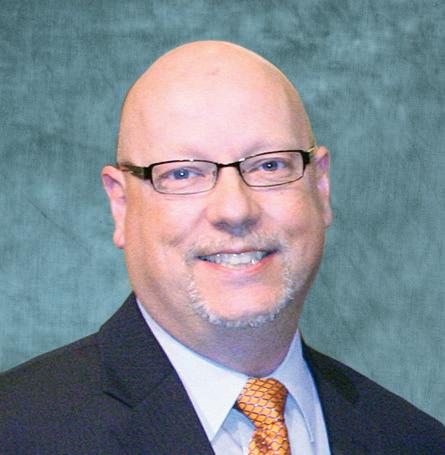Team coverage from the SBC Annual Meeting
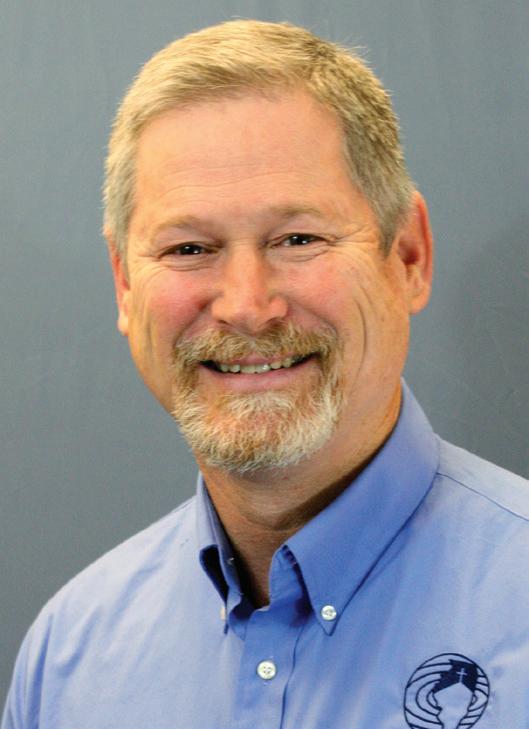


Phoenix | The 2017 Annual Meeting of the Southern Baptist Convention will be remembered for actions it took that were not on the agenda—the condemnation of “alt-right racism.”
One committee’s miscalculation set into motion dramatic actions over the two days of the meeting June 13-14 that drew national attention and emotional response.
The chairman of the 2017 Resolutions Committee, former ERLC Vice-President Barrett Duke, opened his final presentation of a resolution condemning “alt-right racism” with an apology: “We regret and apologize for the pain and confusion we created for you and the watching world when we chose not to report out the resolution on alt-right racism.”
After what the proponent of the original resolution called “a 24hour roller coaster,” the committee brought for a vote a new statement on racism. Messengers to convention approved it, then gave their action a standing ovation.
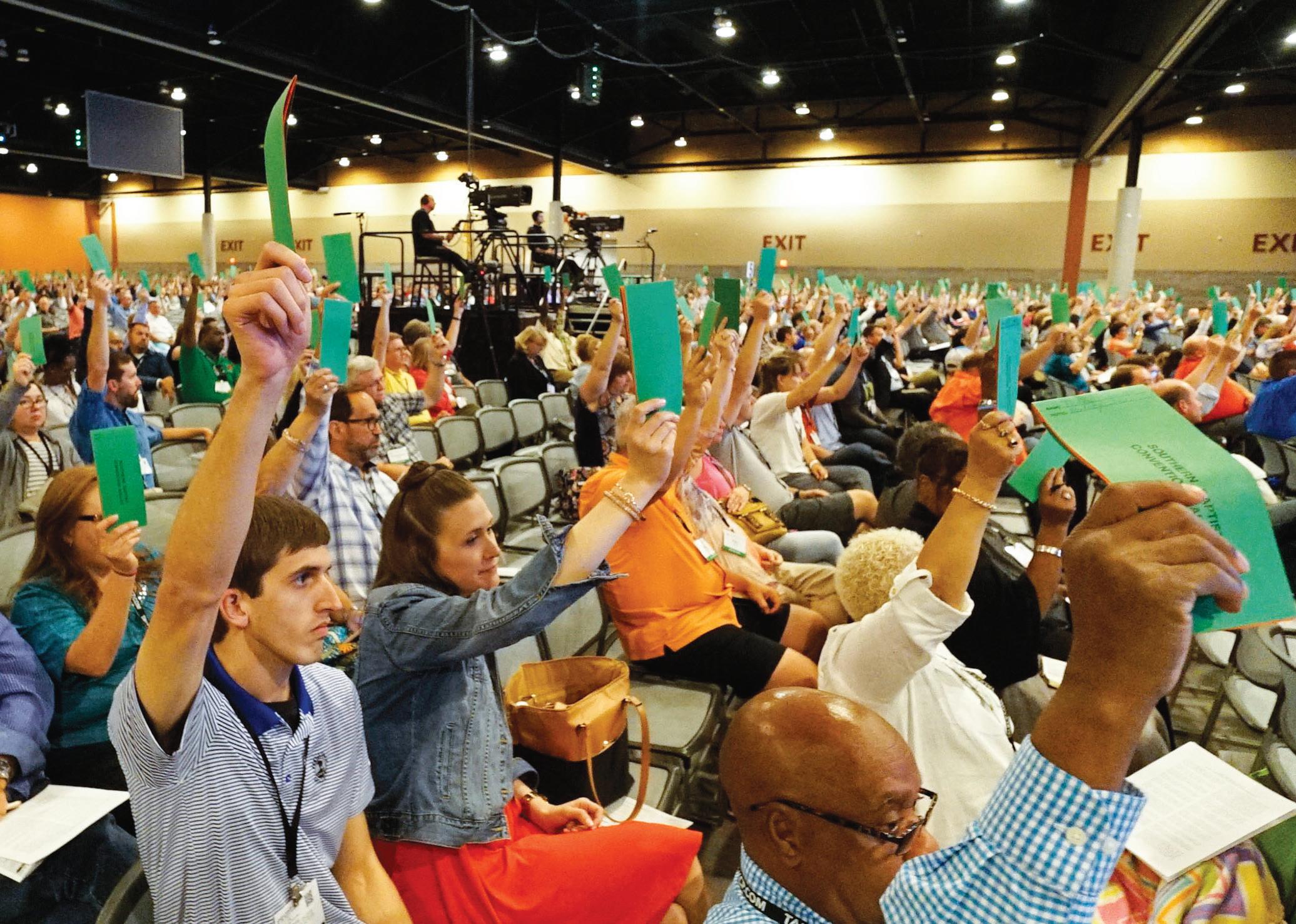
“Today is a great day for all Southern Baptists,” said Byron Day, president of the SBC National African American Fellowship of 4,000 churches. “The resolution to denounce racism and white supremacy is in my view the strongest statement to date by the Southern Baptist Convention,” Day said.

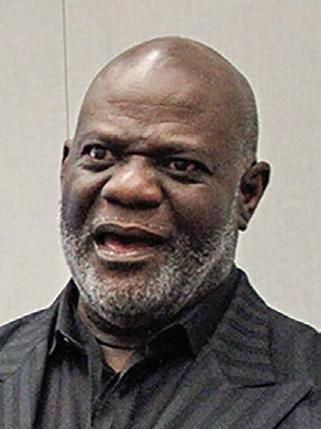




Follow declining baptisms, membership Summer silence After a winter of discontent with the ERLC


June harvest Crusade becomes prototype for annual SBC soul-winning event
Illinois gallery Photos and stories of our own Sandy Wisdom-Martin, Illinois pastors, and busy Baptists from all over I am resolved In addition to alt-right racism, messengers speak on gambling, atonement, and other issues
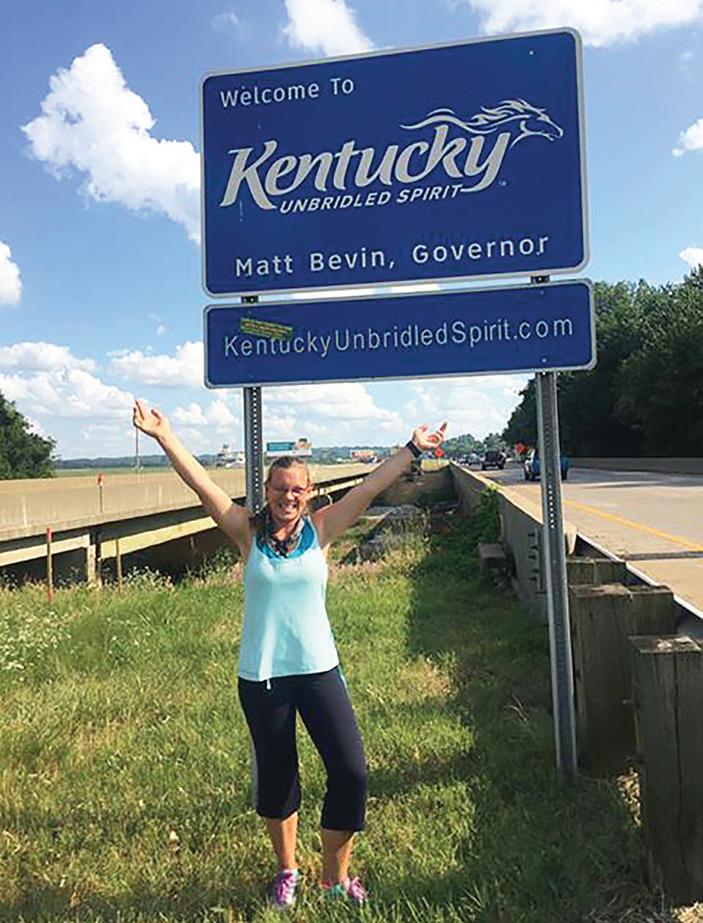
In our hyper-connected culture, it would seem to be easier than ever to develop relationships. But research by the Barna Group says that’s not so.
The average adult in the U.S. reports having 5 close friends
Lower income people reported 2.5 close friends on average. 1-in-5 adults reports being lonely.
Only 1-in-5 said they developed friendships at church. Even so, it appears that fostering relationships is a good ministry opportunity, especially among younger people.
– Barna.org
the cooperative program

Budget Goal: $3,028,846
Received to date in 2016: $2,822,968
2017 Goal: $6.3 Million
Editor - Eric Reed
Graphic Designer - Kris Kell
Contributing Editor - Lisa Misner Sergent
Editorial Contributor - Meredith Flynn
Administrative Assistant - Leah Honnen
The general telephone number for IBSA is (217) 786-2600.

For questions about subscriptions, articles, or upcoming events, contact the Illinois Baptist at (217) 391-3119 or IllinoisBaptist@IBSA.org
The Illinois Baptist is seeking news from IBSA churches. E-mail us at IllinoisBaptist@IBSA.org to tell us about special events and new ministry staff.
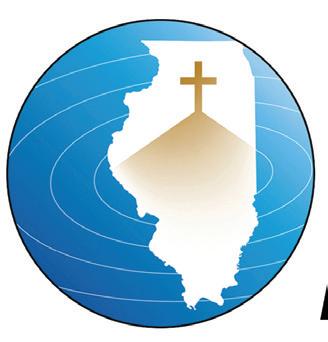
POSTMASTER: The Illinois Baptist is owned and published every three weeks by the Illinois Baptist State Association, 3085 Stevenson Drive, Springfield, Illinois 62703-4440. Subscriptions are free to Illinois Baptists. Subscribe online at IBSA.org
NATE ADAMSI’ve visited Phoenix a few times over the years, but attending the Southern Baptist Convention there recently reminded me again how much it differs from cities here in the Midwest. Of course, it’s a city in the desert, a reality that’s evident even from the sky as one’s plane lands. That difference is even more noticeable as you first breathe the dry air, touch the hot pavement or sand, or simply realize that, at least in the summertime, the brown of Arizona bears little resemblance to the green of Illinois.
In the short walk from my hotel to the convention center each day, I also noticed many different cultural influences, from Native American and Hispanic to the Old West. I saw colorful jewelry, pottery, and clothing in the store windows, and pragmatic architecture spread low across the skyline, all reflecting the unique beauty of the desert.
It wasn’t long, however, before I also began seeing similarities between Phoenix and cities like Chicago. For example, there is great wealth alongside great poverty. There are busy freeways, and constant traffic, and countless people in a hurry. There are many faces that seem sad, or angry, or just empty as they go about their routines. And there are relatively few Baptist churches, or visible evidence of Christian hope.
I’m taking time to paint this picture of Phoenix because I hope that by the time our IBSA Annual Meeting rolls around this November, we may be ready to invite many Illinois Baptists to return there. Discussions with Arizona Baptist leaders during the convention revealed several opportunities for partnership.
For example, there are currently only three African American Southern Baptist churches in the Phoenix association, while Chicago has dozens. On the other hand, Arizona Southern Baptists have been particularly effective in suburban church planting, an area of great need in Chicagoland. We began to see that a complementary partnership between churches in our states, focused especially on church planting in these two “Send Cities” of North America, could give each of them a needed boost in reaching people with the gospel and establishing new Baptist churches.
We also discovered that there are numerous natural connections between the mission field residents of Chicago and Phoenix. For example, according to recent census data, Chicagoans move to Phoenix more than any other metropolitan area except Champaign, Illinois. In fact, more move to Phoenix than to New York, Milwaukee, Los Angeles, Atlanta, or even Indianapolis, which round out the list of top relocation destinations. And while Phoenix is a much smaller city, more than half the number of people that move from Chicago to Phoenix each year also move the other way, from Phoenix to Chicago.
Many Chicagoans “snowbird” in Phoenix. And the fact that both the Cubs and White Sox hold their baseball spring training camps in the Phoenix area is just one factor that keeps the airports full of tourists as well as business travelers. In fact, one travel writer recently referred to Phoenix as “Chicago West,” and commented on the numerous pockets of Chicago culture that can now be found in the desert city.
So, the tale of these two cities isn’t over with the conclusion of this year’s Southern Baptist Convention, at least as far as Illinois Baptists and Arizona Baptists are concerned. We are discussing a more formal partnership, with vision trips in early 2018, facilitated mission trip opportunities next year, and the matchmaking of several church-to-church partnerships. If all goes as planned, our desert partners may even provide Illinois Baptists with a welcome, new experience—the winter mission trip.
Nate Adams is executive director of the Illinois Baptist State Association. Respond at IllinoisBaptist@IBSA.org.

Chicagoans move to Phoenix more than any other metropolitan area except Champaign.
From the front: how the “alt-right” resolution happened
Continued from page 1
Dwight McKissic, an African American pastor from Arlington, Texas, first raised the issue of white supremacy and the “altright” movement in a resolution he submitted to the committee prior to the convention. But on Tuesday afternoon, the committee declined to present McKissic’s statement in the packet of resolutions offered for messengers’ approval. The committee said they felt his draft was unclear and who it considered racist could be misunderstood.
When the committee action was reported, McKissic objected. He wanted the SBC “to make it very clear that we have no relationship with (the alt-right). I thought it would be a slam dunk,” he said.
Two subsequent votes to bring the statement out of the committee failed to get a required two-thirds majority. But the floor discussion by messengers was so emotionally heightened that the resolutions committee began to rethink its position.
Although the vote to bring McKissic’s statement to the floor received only 58% of the vote, it was clear to committee chair Duke and others that a resolution of some kind was needed. They began a writing session that lasted until two o’clock in the morning, Duke said, drafting a statement to clearly condemn “alt-right racism.”




“We were certainly aware that there was a public discussion,” Duke said of the social media posts that questioned Southern Baptists’ position on racism early in the debate, when first efforts to bring a motion failed. “We were aware that this was a conversation that was taking place not only within Southern Baptist life, but outside Southern Baptist life—and that concerned us.
“We certainly don’t want a watching world to think that we harbor or sympathize with those absolutely vicious forms of racism represented in alt-right ideology,” Duke said. “We don’t.”
The “watching world” was brought to the convention’s attention in live time—during debate—when a messenger pleaded for McKissic’s statement to be brought for a vote. Southern Baptists were being characterized as racists in the Twitterverse, he said.
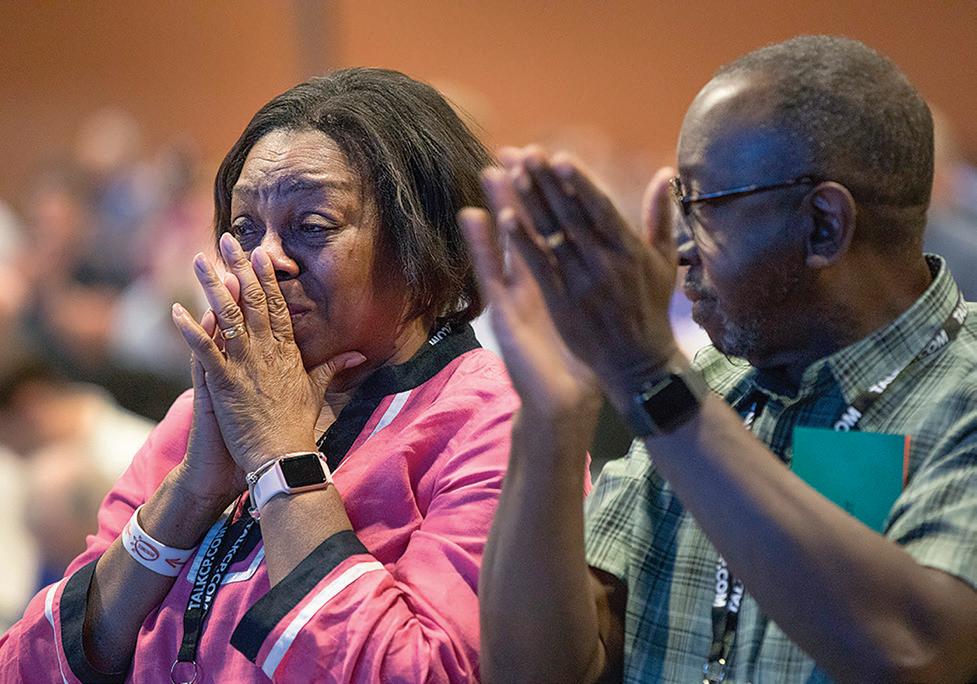
Another messenger urged President Steve Gaines to explain where Southern Bap-
tists stand on the issue of race. Gaines, who because of the denomination’s polity and autonomy does not speak for all Southern Baptists any more than any other pastor, responded with his own church’s deep investment in race relations and ministry to ethnic peoples in racially troubled Memphis. “There is no white race, or black race—only the human race,” he said, declaring God’s love for everyone.
In the late-night writing process, the resolution went through ten editions, Duke said, “but we were glad to do it…. We believe we carried the heart of what Bro. McKissic wanted to do into the heart of this resolution,” Duke said, although not much of the actual language McKissic first submitted was included. The new resolution reviewed previous SBC actions on racism, including a 1995 resolution repudiating the role of slavery in the denomination’s founding and the more recent election of Fred Luter as the SBC’s first African American president.
And at the SBC Pastors Conference a day before the alt-right racism debate, African American pasor H.B. Charles was elected at Pastors Conference President. Charles, from Jacksonville, Florida, told the Washington Post, “I’m glad we picked up the fumble…It could have had a really bad effect on our witness.”
McKissic was in the audience at a news conference following the final vote. Afterward, Duke expressed a personal apology, and the men shook hands. “I’m glad things have developed as they have, for the kingdom of God’s sake. I think we’re back to a good place after a 24-hour roller coaster ride,” McKissic said. Although he was not pleased with the process, McKissic called the vote “a courageous stand.”
Phoenix | Tennessee pastor Steve Gaines was re-elected by acclamation to a second term as president of the Southern Baptist Convention during the June 13-14 SBC annual meeting in Phoenix.
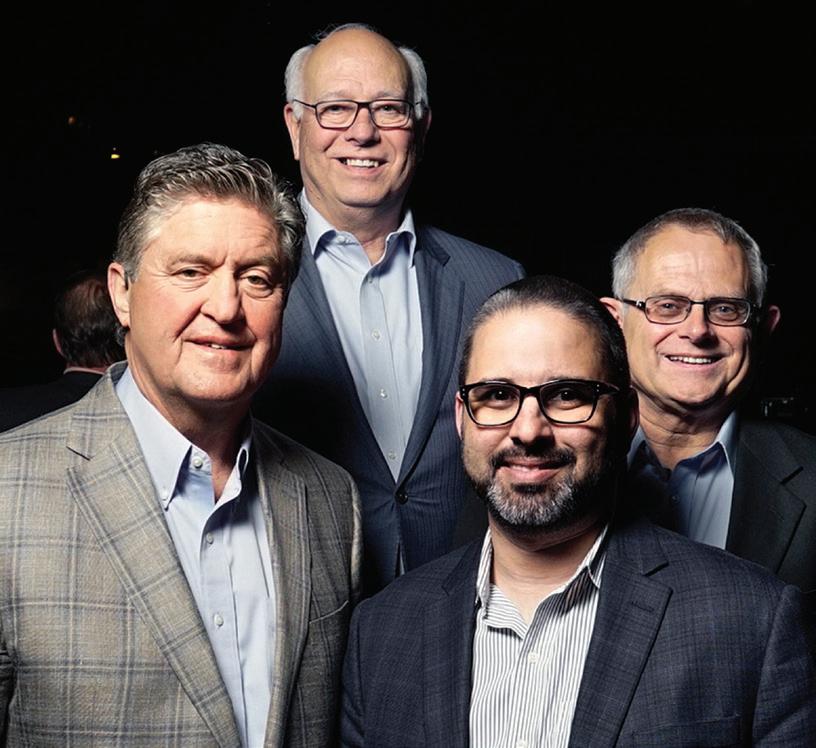
He will lead a diverse slate of officers including Walter Strickland (not pictured), an African American leader of Southeastern Baptist Theological Seminary’s Kingdom Diversity Initiative, first vice president; Jose Abella, a bilingual church planter from Miami, second vice president; John Yeats, who has served as recording secretary for the past two decades; and Don Currence, pastor of First Baptist Church in Ozark, Mo., registration secretary.

Ozark, Mo. | Jim Wells, a 15term Southern Baptist Convention registration secretary known for his humble leadership style, died June 17 following a seven-year battle with cancer. He was 69.
First elected registration secretary in 2002, Wells oversaw messenger registration, ballot counting and reporting of vote totals at SBC annual meetings among other duties. He served alongside eight SBC presidents.
Wells is survived by his wife of 50 years, Judy, a daughter, and a granddaughter.
Get breaking news in The Briefing online, posted every Tuesday at www.ib2news.org.


2016 reports show baptisms and worship attendance decline nationwide. There are 15.2 million of us.
Nashville, Tenn. | Southern Baptists experienced growth in the number of churches in 2016, according to the latest Annual Church Profile report (ACP). However, other key measures declined in 2016, including membership, baptisms, average worship attendance and total giving, according to LifeWay Christian Resources, which compiled the reports gathered by Baptist state conventions.
The number of churches cooperating with the Southern Baptist Convention grew by 479 to 47,272, a 1% increase over 2015. The number of Southern Baptist churches has increased the last 18 years. Southern Baptist churches also reported 4,492 church-type missions last year.
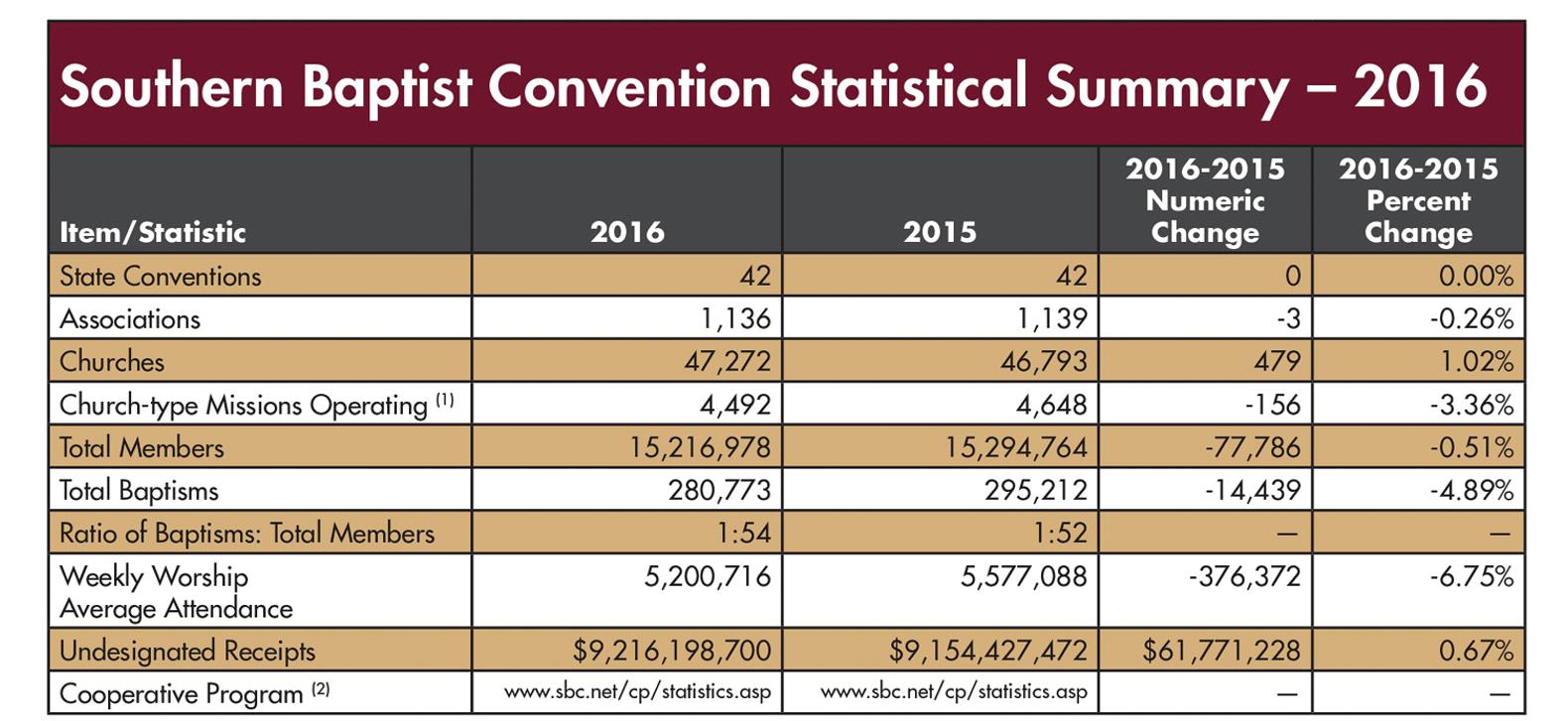
Although the number of cooperating Southern Baptist congregations grew, membership of those churches declined by 77,786, down 0.51% to 15.2 million members. Average weekly worship attendance declined 6.75% to 5.2 million worshippers.
Southern Baptist churches baptized 280,773 people in 2016, a 4.89% decline from the 295,212 reported in 2015. The ratio of baptisms to total members was one baptism for every 54 members.
“We would be remiss in not giving thanks for every baptism and every new follower of Christ,” said LifeWay President and CEO Thom S. Rainer. But, “it’s clear that evangelism and discipleship are waning. I don’t believe it is due to the lack of opportunities, though. Instead, there is a lack of engagement.”
Southern Baptists have seen a decline in the num-
ber of baptisms for several years. Rainer said while most churchgoers believe it’s their personal responsibility to share their faith, most never do.
“We should follow Christ’s example and pray to the Lord of the harvest to send out workers,” Rainer said. “Let us pray that God will send out the workers in our pews to engage those who don’t yet know him.”
Frank S. Page, SBC Executive Committee President and CEO, noted “virtually everyone who sees these figures will react negatively and lament the
poor state of our churches, our lack of evangelistic fervor, and our increasingly irrelevant programs. Indeed, we all should.
“However, the stark reality of these numbers should cause each of us to look inwardly,” he said.
“Am I sharing the gospel as I should? Am I developing relationships with family, friends, coworkers, and others with whom I can gain an opportunity to share the good news? Am I burdened for the lost and praying for their salvation?”
– Carol Pipes, LifeWayPlease Call Governor Bruce Rauner to VETO
HB 40 removes all prohibitions on taxpayer-funded abortion throughout all nine months of pregnancy under Medicaid and removes the ban from state employees’ insurance policies paying for abortions. Because a half million have been added to the Medicaid roll in the last 5 years, we could see 15,000 or more babies slaughtered with our tax dollars each year!
HB 1785 is a highly controversial proposal that would make it significantly easier for gender-dysphoric persons to obtain falsified birth certificates by changing the sex on their birth certificate, which is both a legal and historical document.
Please encourage Governor Rauner to VETO these bills: Springfield (217) 782-0244 Chicago (312) 814-2121
Rescue those who are unjustly sentenced to death; don’t stand back and let them die. Don’t try to disclaim responsibility by saying you didn’t know about it. For God, who knows all hearts, knows yours, and he knows you knew! And he will reward everyone according to his deeds.
—Proverbs 24:11-12 (Living Bible)
708-781-9328
Bulletin Inserts are available! Email us at Contactus@illinoisfamily.org.
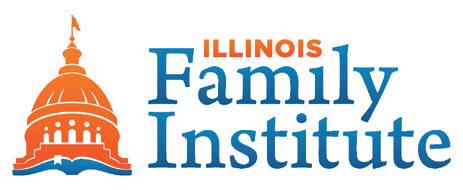
September 30 | IFI Faith Forum with Ray Comfort
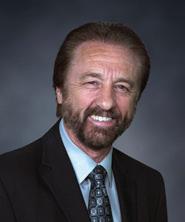
Medinah Baptist Church, Medinah, IL
We are pleased to have Ray Comfort for an event we have titled “Equipping the Saints: Abortion, Homosexuality, Atheism and YOU!” Ray is the Founder and CEO of Living Waters ministry and the best-selling author of more than 80 books, including “How to Know God Exists,” “The Defender’s Guide for Life’s Toughest Questions,” and “The Evidence Bible.” Ray may be best known for his award-winning documentary “180.”
October 5 | IFI Christian Heritage Forum with David Barton Decatur Conference Center, Decatur, IL
We are pleased to have David Barton headline this special event. He is a beloved Christian minister, conservative activist, and the Founder and President of WallBuilders, a national pro-family organization that presents America’s forgotten history and heroes, with an emphasis on our moral, religious and constitutional heritage.
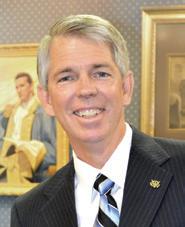
October 27 | IFI Faith, Family & Freedom Banquet
The Stonegate, Hoffman Estates, IL
This year we are excited to have Lt. Col Allen West keynote our annual fundraising event. During his 22-year career in the Army, he served in Operation Desert Storm and Operation Iraqi Freedom, receiving many honors including a Bronze Star. In 2010, West was elected as a member of the 112th Congress representing Florida’s 22nd District. He is a Fox News contributor and author of “Guardian of the Republic.”
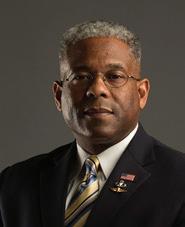
Phoenix | Debate over a resolution condemning “alt-right racism” took the spotlight, but lesser reported actions at the 2017 Southern Baptist Convention will address another serious issue facing the denomination, an ongoing decline in baptisms and membership. And a matter some anticipated would make headlines failed to produce debate, complaints against leadership of the SBC’s Ethics & Religious Liberty Commission.
SBC President Steve Gaines announced plans for a year-long study on evangelism in the denomination, and the presentation of a plan for more effective soul-winning by SBC churches and pastors. Gaines’ effort comes after another year of baptism declines and a decade of shrinking SBC church membership. (See story on page 4).
“I was not prompted by any man to get this done,” Gaines said in Phoenix, “but the Lord laid this on my heart to emphasize prayer last year, and to emphasize evangelism this year.”
The Memphis-area pastor, who was re-elected to a second one-year term, named 19 pastors, professors, and seminary presidents to a task force, which will bring recommendations at the
If we took a selfie in Phoenix, this would be it. Busy days framed by prayer are represented in this photo from the Phoenix Convention Center during the June 13-14 SBC Annual Meeting and the week of meetings, preaching, and witnessing that preceeded it.

Team Coverage in this section, pages 5-10
PLUS related articles on pages 1, 3, and 4
2018 convention in Dallas. Southwestern Seminary President Paige Patterson, a proponent of traditional personal evangelism, will chair the panel. And Illinois’ Doug Munton, pastor of First Baptist Church of O’Fallon will also serve.
Gaines asked North American Mission Board President Kevin Ezell to present the motion creating the task force. Ezell outlined the troubling situation among SBC churches: The SBC has seen a steady decline in baptisms since 1980; 80% of SBC churches baptized 9 or fewer people in the most recent report of Annual Church Profiles, 50% reported two or fewer baptisms, and 25% baptized no one.
“I don’t think any pastor in the room would say they don’t have a passion for the lost, but I do think there is a practice problem,” Ezell said.
After the Phoenix meeting, Gaines urged continued prayer for renewal in our churches. “We must make prayer, evangelism and discipleship the priorities of our lives. We must jettison our selfish agendas and focus on Christ’s Great Commission,” Gaines said.
An anticipated debate over the ERLC did not materialize at the convention. Leaders had worked since January to heal strained relations between ERLC President Russell Moore and some pastors who objected to his comments about candidate Donald Trump last year, and also to his stance on a controversial religious liberty case involving construction of a mosque in New Jersey.
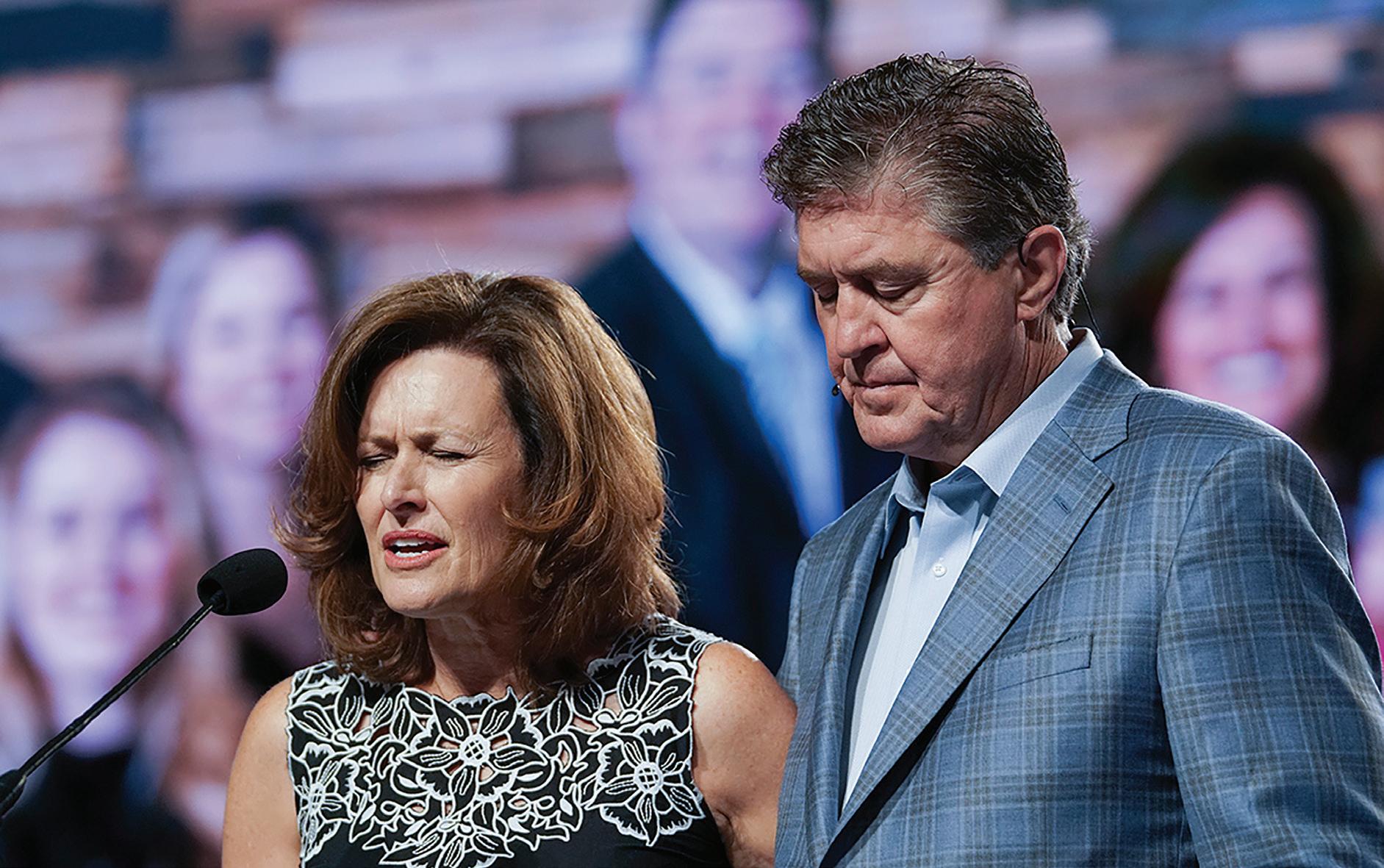
Moore would not comment on recent published reports that characterized the conflict as unresolved, positioning it as a generational tug-of-war between older Southern Baptists and younger leaders new to their positions. One report also said the ERLC is having difficulty accessing the Trump administration. Southern Baptists have been represented by Texas pastors Robert Jeffress and Jack Graham at recent White House functions involving religious freedoms.
Moore told the Illinois Baptist at a news conference that he saw the annual meeting as a “family reunion” of people who together advance the gospel.
The ERLC report was the last item on the convention agenda, when attendance in the hall is usually low and time for questions is limited. One motion to defund the ERLC was ruled out of order, as the SBC budget had been approved early in the opening session.
Moore restated the ERLC’s commitment to represent Southern Baptists on issues of marriage and family, sanctity of life, and religious liberty. “We are committed to be the Paul Revere, going ahead, speaking to churches, speaking to the officials, speaking to the public square… speaking to the watching world with a different word,” Moore said.
Moore interviewed Chicago pastor Nathan Carter about his church’s lawsuit against the city, which has blocked their purchase of a building in the University District because of parking rules. (See story on page 9.)

Moore was at the table at a news conference on the first day of the convention, when the chair of the Resolutions Committee, former ERLC Vice President Barrett Duke explained why the panel did not bring the proposed resolution on racism and the alt-right supremacy movement to the floor for a vote. (See story on page 1.) Moore was reportedly involved in the late-night writing session that produced a new resolution on the issue. And he addressed the proposal as a messenger from the floor.
“Southern Baptists were right to speak clearly and definitely that ‘alt-right’ white nationalism is
not just a sociological movement,” Moore later said, “but a work of the devil.”
The resolution “on the anti-gospel of alt-right white supremacy” urged messengers to “earnestly pray, both for those who advocate racist ideologies and those who are thereby deceived, that they may see their error through the light of the Gospel, repent of these hatreds, and come to know the peace and love of Christ through redeemed fellowship in the Kingdom of God, which is established from every nation, tribe, people, and language.”
Another resolution addressed “the importance of moral leadership.” That resolution was a repeat of one passed during the Clinton administration’s Monica Lewinsky scandal. When asked whether the resolution was directed toward the Trump administration, Duke pointed out that neither the 1998 resolution or this one mentioned the president by name. We need moral leadership at every level, he said.
The resolution urged messengers to pray “that God will help us and all our fellow citizens to embrace the biblical moral values that will honor our creation in God’s image and bring God’s blessing on our nation.”
Ten resolutions in all were passed.
– One on gambling specifically named it as a sin.
– A statement reaffirmed the doctrine of penal substitutionary atonement—which says Jesus took upon Himself in His death the divine punishment due sinners—“as the burning core of the Gospel message and the only hope of a fallen race.”
– And a resolution on campus ministry “urged our fellow Southern Baptists to devote considerable
prayer,” among other resources, to “evangelistic and discipleship endeavors” on college and university campuses.
The Executive Committee brought a $192-million Cooperative Program allocation budget for next year. Messengers approved it. They also granted permission for the EC to sell its current building in downtown Nashville, should they receive a good offer. A building boom in the city has made the property very valuable, as was the case with the massive LifeWay publisher’s facilities which were sold last year in order to downsize. Proceeds after relocation would go to missions, EC President and CEO Frank Page said.
Another motion brought more Midwest representation to the Executive Committee. Four regions were given representation, even though they have too few church members to apply under the provisions of SBC Bylaw 30. The recommendation amended Bylaw 18 to list the Dakotas, Iowa, Minnesota-Wisconsin and Montana conventions as each being entitled to a single EC representative.
With this Annual Meeting, Illinois representative Wilma Booth completed two four-year terms on the EC. She will be succeeded by Adron Robinson, pastor of Hillcrest Baptist Church in Country Club Hills. And Sharon Carty, member of Emmanuel Baptist Church in Carlinville, will replace Charles Boling of Marion.
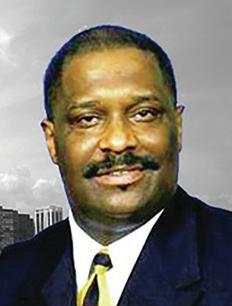
Messengers at the 2017 convention totaled 5,018.
The 2018 SBC will be held in Dallas.
– with additional reporting by Baptist Press
“I believe with all my heart that the Southern Baptist Convention is not racist, and does not stand for the alt-right. It breaks my heart that we’re evening having this debacle, because it’ll hurt the efforts of Southern Baptist churches in racially diverse communities to reach those communities with the gospel.”
– Stephen Fountain, pastor, FBC, Buford, Ga., in the Wall St. Journal, June 14, 2017
“It shows we’re willing to bring issues to the floor, real issues. We’re not intimidated or afraid to speak out, even though it brings up dirty laundry from the past
– Mark Croston, national director of black church partnerships, Lifeway Christian Resources, in the Washington Post, June 14, 2017
Platt brings positive report, NAMB ‘will do its part’
Phoenix | The heads of the Southern Baptist Convention’s two mission sending agencies —the International Mission Board and the North American Mission Board—each presented a report to messengers at the annual meeting in Phoenix.
The IMB is in a stable financial position, “setting the stage” to send more missionaries to share the Gospel, IMB President David Platt reported.

Platt thanked Southern Baptists for increased giving to the Cooperative Program and approximately $153 million given to the Lottie Moon Christmas Offering. He noted the IMB no longer uses property sales for operations and that the mission board’s reserves are funded at appropriate levels.
“In other words, the IMB is healthy financially, and what that means is, the stage is now set for Southern Baptists to stop decreasing and start increasing the number of missionaries we have serving around the world,” Platt reported to applause.
Hundreds of current missionaries sent Twitter-length reports* to share with messengers how they are seeing God at work around the world, with messengers hearing a number of them:
– They saw the first church ever started among a Muslim people in Sub-Saharan Africa.
– A woman learned at a Value of Life training in South Asia that abortion is not God’s will. In seeking forgiveness, she found salvation through Christ.
– In East Asia, they helped a believer plant a church over the last seven months in one of the hardest places in that part of the world. Ten people have now confessed Christ and 12 others have already been baptized.
– In North Africa, they trained up and sent out a small group of Muslim-background believers to a country hundreds of miles away. Those believers have now planted 20 churches with over 220 people baptized.
“This is the work of the IMB,” Platt said. “And this is happening every single day.... Disciples are being made, churches are being planted, pastors are being trained and missionaries are being sent from the nations to the nations… God is being glorified among people and entire people groups who until now had never heard the name of Jesus.
“This is the work of the IMB and, Southern Baptists, I want to call us to send limitless more missionaries to do that work all around the world.”
Ezell says planting is evangelism
Pledging “NAMB will do its part,” NAMB
President Kevin Ezell said the SBC needs a “Gospel Conversation Resurgence” if declining baptism numbers are to turn around.
Ezell shared how Dan Coleman, church planting missionary in Augusta, Maine, has averaged 100 baptisms annually since his church was planted. La Chapelle, a church plant in Montreal, has baptized more than 450.
“Church planting is evangelism,” Ezell said. Citing an analysis of the SBC’s Annual Church Profile (ACP) from 2015, Ezell said church plants baptize a new believer for every 10 worship attendees.
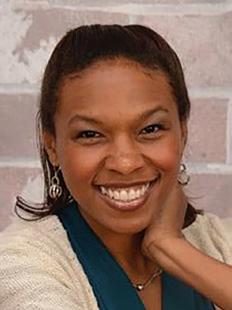
In 2016, Ezell said Southern Baptists started 732 new churches in North America with 232 new affiliations for a total of 964 new congregations.
“Your missionaries are reaching people for Christ,” Ezell said. “More Gospel congregations will lead to more Gospel conversations.”
In several state conventions, churches started since 2010 account for more than 20% of all SBC churches. In the Penn-South Jersey, Minnesota-Wisconsin, and New York state conventions, 30% of all churches were started since 2010.
“Southern Baptist work is growing stronger and stronger in these areas because your churches sacrificially send the resources,” Ezell told SBC messengers.
“We exist to serve pastors and churches,” he said. “You are the missionary-sending centers. You are the church planting centers.”
– from Baptist Press reports
ADMIT ONE – Sammy Simmons, pastor of Immanuel Baptist Church of Benton, holds up the hottest ticket at the SBC, a blue wrist band admitting him to the International Mission Board Dinner.

DINNER MUSIC – At the IMB dinner, Fushicho Daiko, a professional “taiko” Japanese-drum group, performs for 1,350 people in attendance.
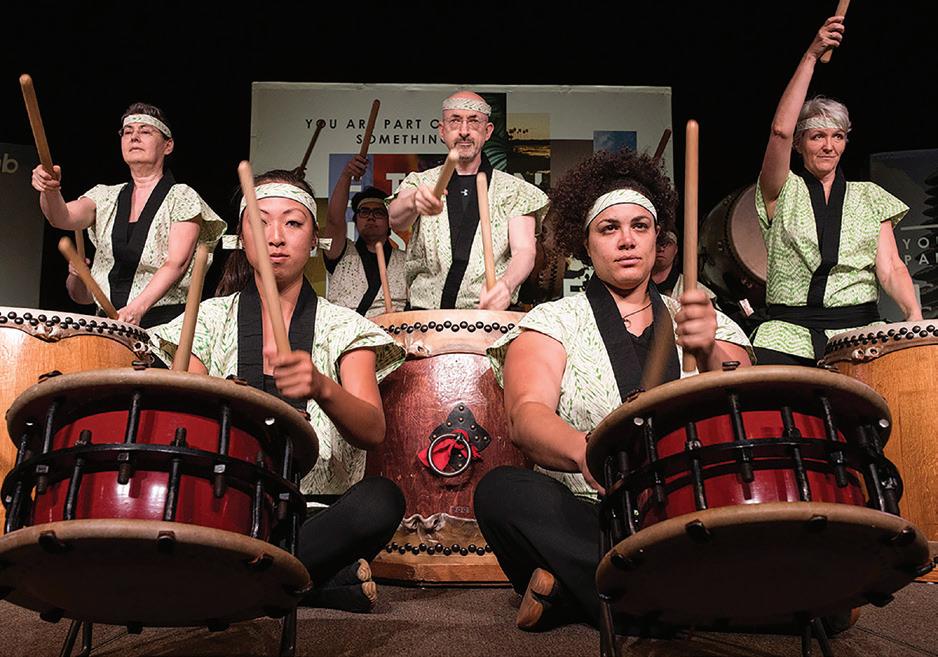
GODSPEED – Messengers pray for 31 new IMB missionaries as they are commissioned for service. “Southern Baptists, this is part of, if not the primary reason we came together in the first place,” said IMB President David Platt
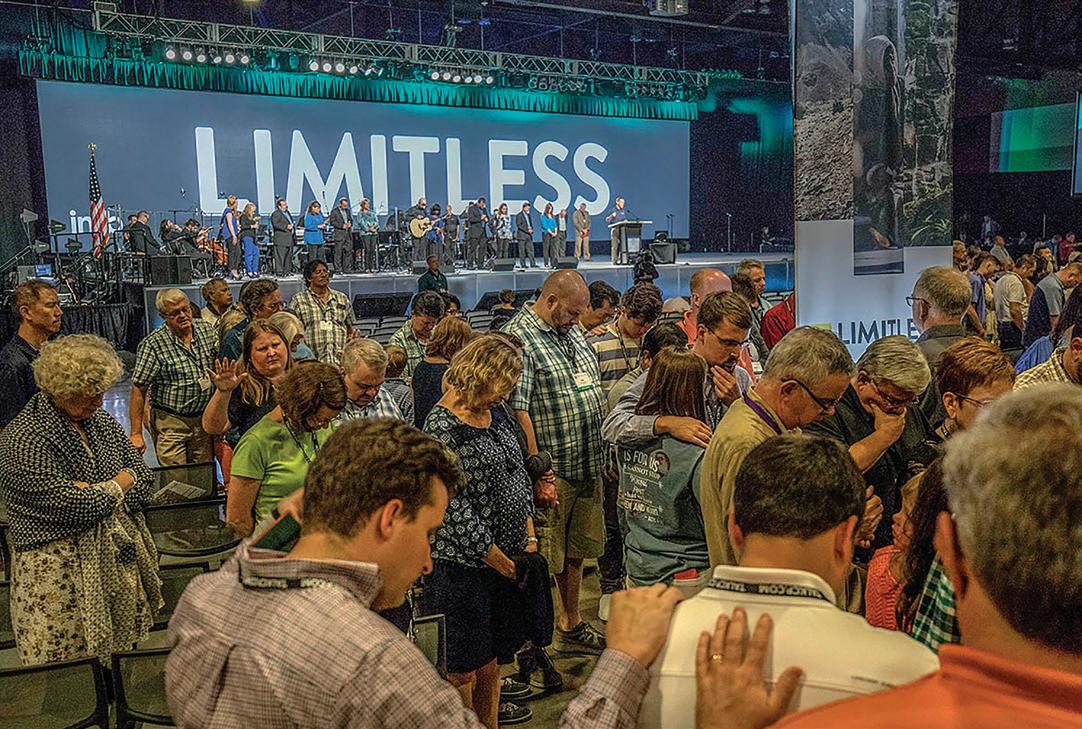
“The so-called Alt-Right white supremacist ideologies are anti-Christ and satanic to the core. We should say so.”
– Russell Moore, ERLC President, on Twitter, June 14, 2017
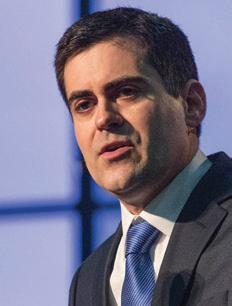
ILLINOIS PARTNERSHIP – “You’re probably not in Illinois when you have salsa on your breakfast burritos,” said IBSA’s Pat Pajak. He was right. IBSA hosted a meeting to explore church planting partnerships between Arizona and Illinois.
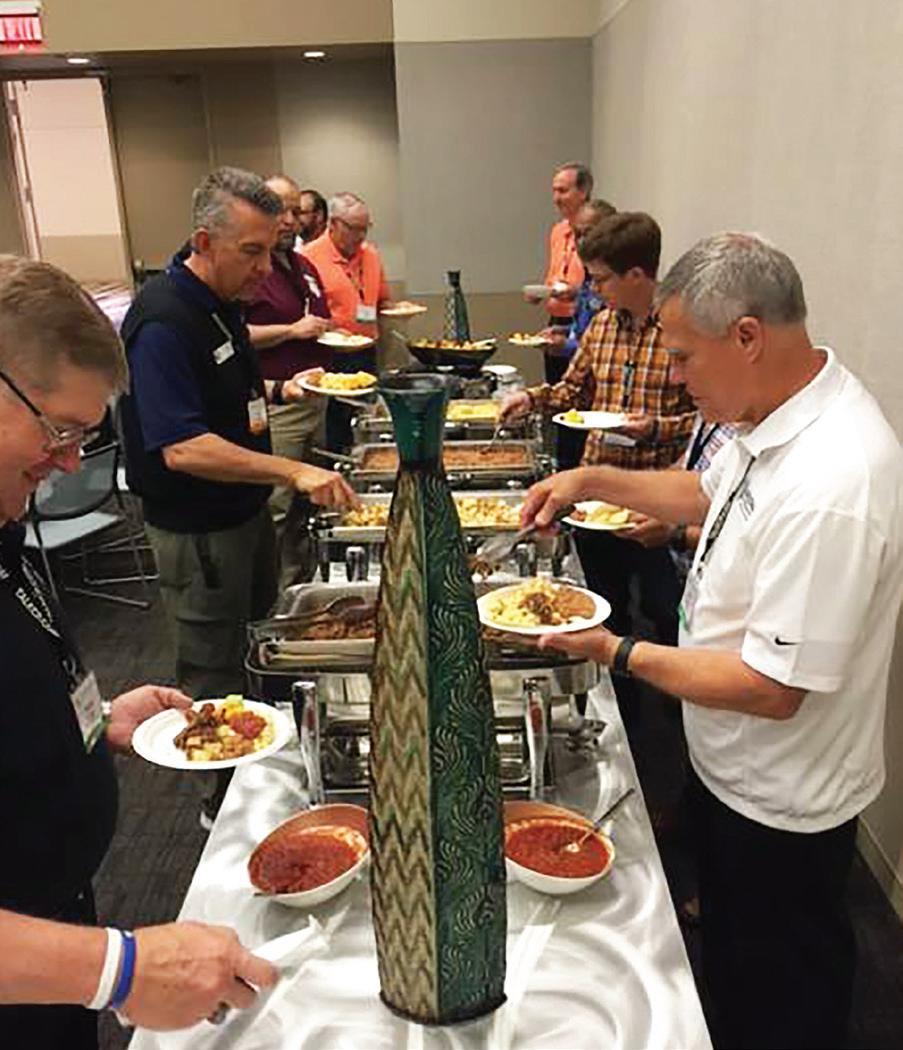
“I think it’s important that we take every opportunity to denounce and set ourselves apart from anything that is racist or alienates our brothers and sisters in Christ who are people of color, especially given our history.”
– Trillia Newbell, ERLC director of community outreach, on National Public Radio, June 14, 2017PLATT
Wisdom-Martin leads her first national annual meeting
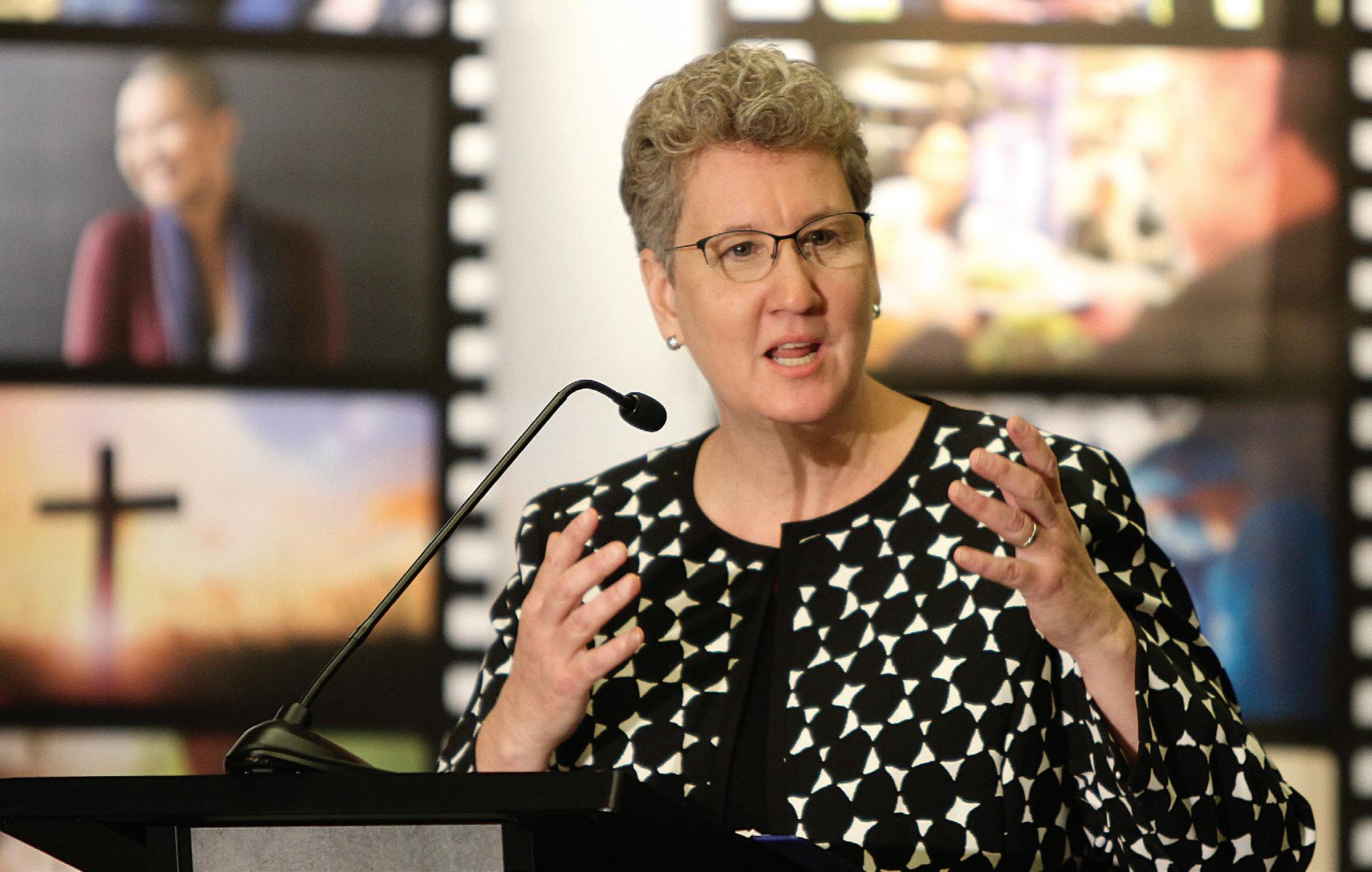
Phoenix | The first WMU Missions Celebration and Annual Meeting with Illinois’ own Sandy Wisdom-Martin as Executive Director was held June 11-12 at the Renaissance Phoenix Downtown Hotel. Themed “Defining Moments,” the meeting focused on those dramatic, life-changing experiences that make an eternal difference in the hearts and minds of Christian believers.
“The meeting with Sandy at the helm was wonderful,” shared Jill McNicol, Illinois WMU President, who attended the meeting. “You could see her heart and creativity throughout the meeting. I have great confidence in the mission of WMU with Sandy leading the charge.”
McNicol called the meeting inspirational and praised its focus on missions education. “She provided those in attendance with the inspiration to keep our eyes on Jesus and not rest, because the job of reaching the nations is not finished. Sandy also expressed in a nutshell the reason we believe in mission education—making disciples who make disciples starts with the very youngest in our churches.”
Living examples
“Often we make a mess of our lives and wonder if it can ever be fixed,” said Linda Cooper, WMU national president, who joined Wisdom-Martin on the platform at the gathering across the street from the Phoenix Convention Center and again later during the SBC annual meeting. “When Christ shows up, he restores us and give us new purposes.”
Cooper recalled meeting Skeeter, a kitchen manager at a Nashville mission this past spring. The former homeless man had been beaten and thrown from a bridge when he came to that rescue ministry. There he “learned about grace and experienced God’s saving grace.”
Throughout the meeting, Southern Baptist missionaries serving throughout the world shared similar stories of restoration and release.
North American Mission Board appointees Jacob and Jessica Dahl serve as church planters in Ellensburg, Wash., home to 11,000 college students at Central Washington University. In their church plant, the missionary couple has seen more than 103 persons baptized and 98 salvations.
As an International Mission Board worker in Thailand since 1992, Cheryl Derbyshire directs Thai Country Trim, a ministry that provides income for more than 200 rural village women who use their talents and gifts to produce WorldCraft products. As their handiwork is sold across the world, the women are being led to Christ.
The WMU annual meeting concluded Monday night when nearly 700 persons viewed the movie “Mully,” and met the subject of the film.
Charles Mulli grew up in Kenya, begging on the streets, and became a Christian as a teenager. He became a wealthy entrepreneur, met and married Esther, and they had eight biological children.
In 1989, Mully said, the Lord laid it on his heart to help other children living in poverty in Africa. He sold his property and businesses to provide street children in Africa with shelter, medical care, and education. Since then the couple have taken guardianship of more than 12,000 abandoned children.
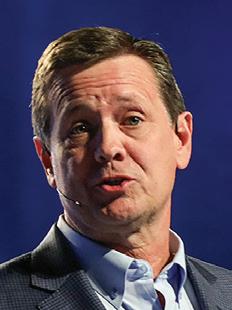
WorldCrafts is partnering with Mully Children’s Family (MCF) to help share his story and expand WorldCrafts impact among impoverished artisan groups around the world.
WMU celebrates Job Corps Cooper and Wisdom-Martin highlighted 20 years of ministry through Christian Women’s Job Corps (CWJC) in their report to the Southern Baptist Convention June 14.

Since Christian Women’s Job Corps started in 1997, 40,000 women have been touched through the program in nearly 200 sites and, collectively,
“For years now, we have declined in the number of Southern Baptist missionaries serving around the world. But this year, the stage is set for that trend to be reversed… for Southern Baptists to send more missionaries through a multiplicity of pathways.”
– IMB President David Platt
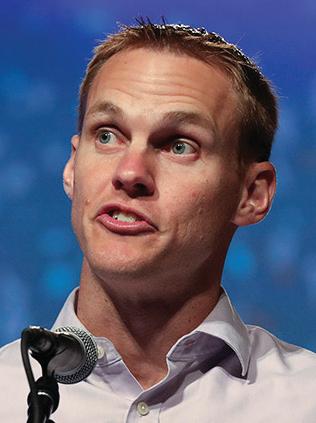
“If one member from each of our 47,000 churches shares the gospel each day, it would result in over 17 million gospel conversations in a year. Can you imagine what would happen if Southern Baptists had that many gospel conversations?”
– NAMB president Kevin Ezell160,000 volunteers have served 200-million hours in the ministry. In 2004, WMU started Christian Men’s Job Corps.
Wisdom-Martin told of a woman named Flo who has served as coordinator of a CWJC site since 2005. She recounted that Flo said of CWJC, “Looking at the women who came in broken and left whole, I knew this was where I was meant to be. I fell in love with them and knew this was where I could make a difference.”
– By Baptist Press with additional reporting from the Illinois Baptist
“From prayerwalking in West Africa, to fitting wheelchairs and sharing the gospel in the Eastern Europe, to Bible stories and dressing wounds in the desert, [God] affirmed his call on my heart to the nations and brought me from a place of timidity to sharing truth.”
The speakers at the Southern Baptist Pastors Conference may not have been as recognizable or as quotable as the usual big-church preachers at this event, but the 12 average-church pastors on the bill made up for it by being relevant to smaller church ministry and relatable to their peers in the chairs.
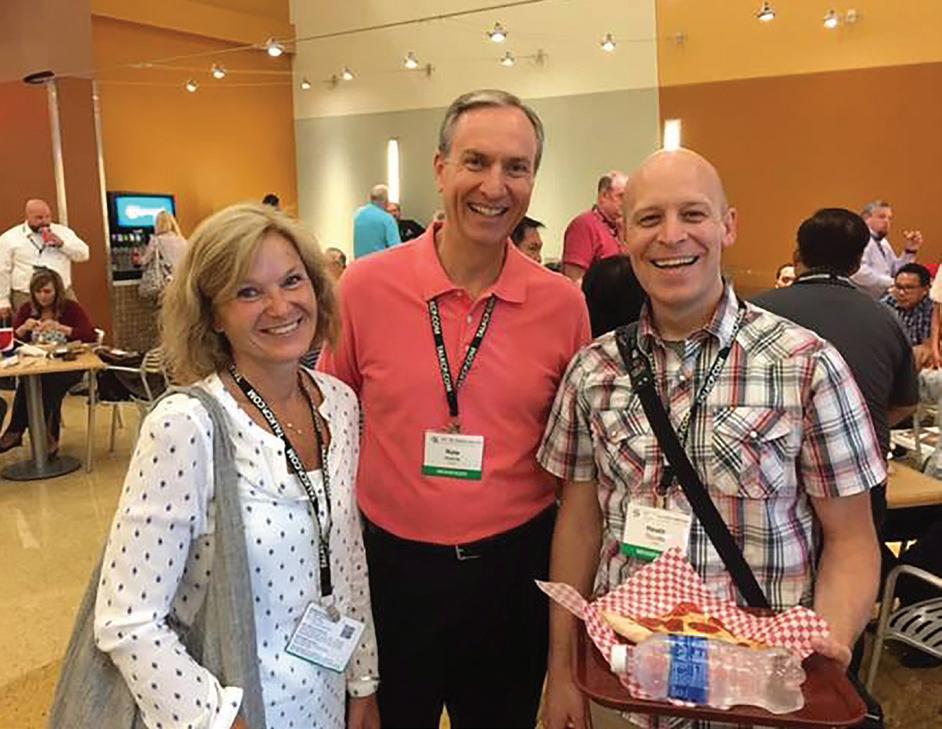
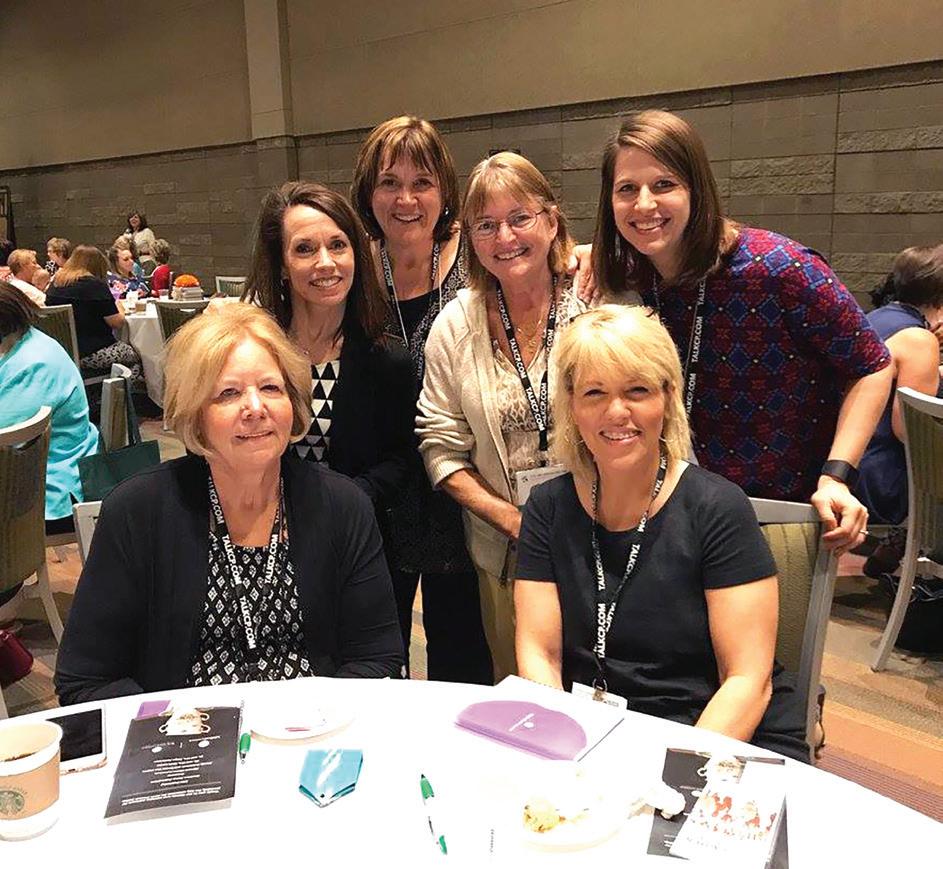
Overall, the downsized event was deemed a success by organizers and attenders. “No smoke. No show. No mood setting. Only a man and his Bible,” tweeted Mike Wilbanks of Mississippi. (And a Celtic-style band led by “In Christ Alone” composers Keith and Kristyn Getty.)
Iowa pastor and blogger Dave Miller ran for conference president last year on an “average-church” platform. He promised to bring speakers from regular-size churches. He also planned to focus on a single book of the Bible, with the preachers taking successive passages, rather than letting speakers take their best shot at a theme.


The book was Philippians. Two pastors from Illinois were invited to preach.
Chicago pastor and church planter David Choi opened the conference with a challenge to his colleagues: don’t rely on yourself or your own accomplishments, rely on Christ. His sermon from Philippians 1:1-11 focused on the Christian’s identity.
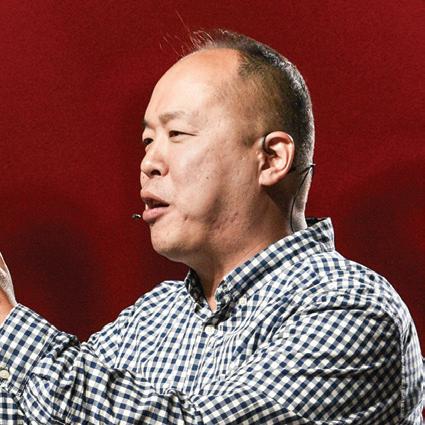
Choi encouraged pastors in their spiritual walk, telling stories from his own. “You don’t want to be defined by your performance; that well leads to destruction,” the planter of Church of the Beloved in Chicago’s University District said, sharing his onetime reliance on personal achieve ment. Neither does failure identify the believer. “Pastor, your past does not define you. Christ’s past defines us… It has nothing to do with you, everything to do with Christ. Rest in your gospel identity.”
Uptown Baptist Church Pastor Michael Allen was the other preacher from Illinois. “There is an obsession these days with leadership and not followership,” he said. “Yet, there are at least twice as many scriptural references to followership than there are to leadership.”
Preaching from Philippians 3:17–4:1, Allen pointed to two imperatives to followership: Paul exhorts the people to become like him as he follows Christ. And Paul says to pay attention to other saints who are already living examples.
“Paul is not talking about a program for your church,” Allen said. “He’s talking about following godly people. It’s not about borrowing a sermon or a song you got at a conference but by being influenced by those who are worthy of being imitated.”
Charles elected Jacksonville, Fla., pastor H.B. Charles was elected president of the 2018 SBC Pastors Conference, becoming the first African American to hold the post.
Charles was nominated by Lutz, Fla. pastor Ken Whitten, who said, “I want to be real clear about one thing—I am not nominating H.B. Charles because of the color of his skin. I’m suggesting that he be the conference president because of the character of his soul and the convictions of his spirit.”

Whitten shared about Charles’ pastoral ministry experience and commitments to the inerrancy of Scripture and expositional preaching, adding, “All of this has given H.B. a vision of what every Southern Baptist pulpit can look like, when we make Jesus Christ the central figure of our preaching and the cross the central factor of our preaching.”
Charles’ remarkable expository preaching became known to many Illinoisans at the 2016 IBSA Pastors Conference, where his skilled explanation and engaging delivery both held and moved his audience at Broadview Missionary Baptist Church.
As there were no other nominees, current conference president Dave Miller asked the crowd to vote by standing and cheering, and the entire auditorium erupted in applause.
Miller was pleased with the attendance, “blown away” as he tweeted from the platform with a photo of the audience. Miller opened the conference with thanks to all who made the event possible, without naming names for the sake of time. Some funds that usually would have funded the event were used to provide “scholarships” for pastors who would not have been able to attend—62 of the them at $1,000 each.
New Orleans Baptist Theological Seminary, with its new Caskey Center for Church Excellence specializing in smaller congregations, partnered with Miller to produce the event and covered much of the cost.
Phoenix | An Illinois Southern Baptist church was featured prominently in the report from the Ethics and Religious Liberty Commission (ERLC) to the Southern Baptist Convention.
ERLC President Russell Moore interviewed Chicago pastor Nathan Carter about a lawsuit involving his church, Immanuel Baptist, and the City of Chicago. Moore described the case as “not just about this one congregation. That case is about our children, and grandchildren, and our mission field.”
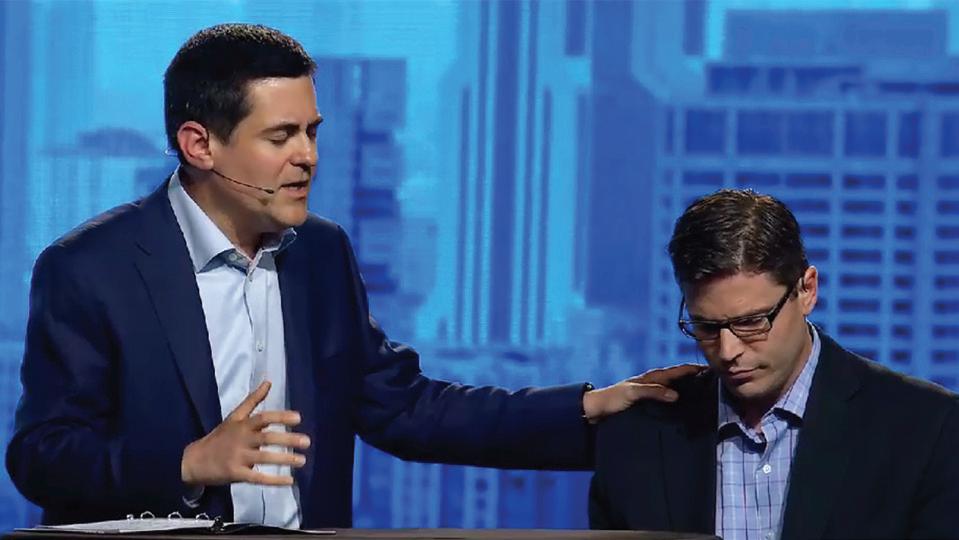
The lawsuit was filed because the City of Chicago has tried to block the purchase of the building where the church has met since 2011 due to a zoning ordinance that requires religious assemblies to have a certain number of parking spaces based on the number of people they seat. Immanuel needs 19 spaces to comply, but utilizes street parking as other businesses in the area do. Immanuel is arguing the ordinance violates the Religious Land Use and Institutionalized Persons Act (RLUIPA) by requiring stricter standards of religious assemblies than for other organizations.
Carter told Moore, “We’ve exhausted all our options, except for this last one… Sometimes you have to do the things you don’t want to do, to get to the things you want to do.
“We’re here to serve the city. We don’t want to be known as that angry church that’s trying to look out for itself… We want to be known as that church that loves its neighborhood so much that we want to be a permanent part of it.”
Moore led messengers in prayer for Carter and Immanuel Baptist. Adron Robinson, pastor, Country Club Hills Baptist Church in Hillcrest, was in the room and reached out in prayer for his fellow Illinois church (see photo).
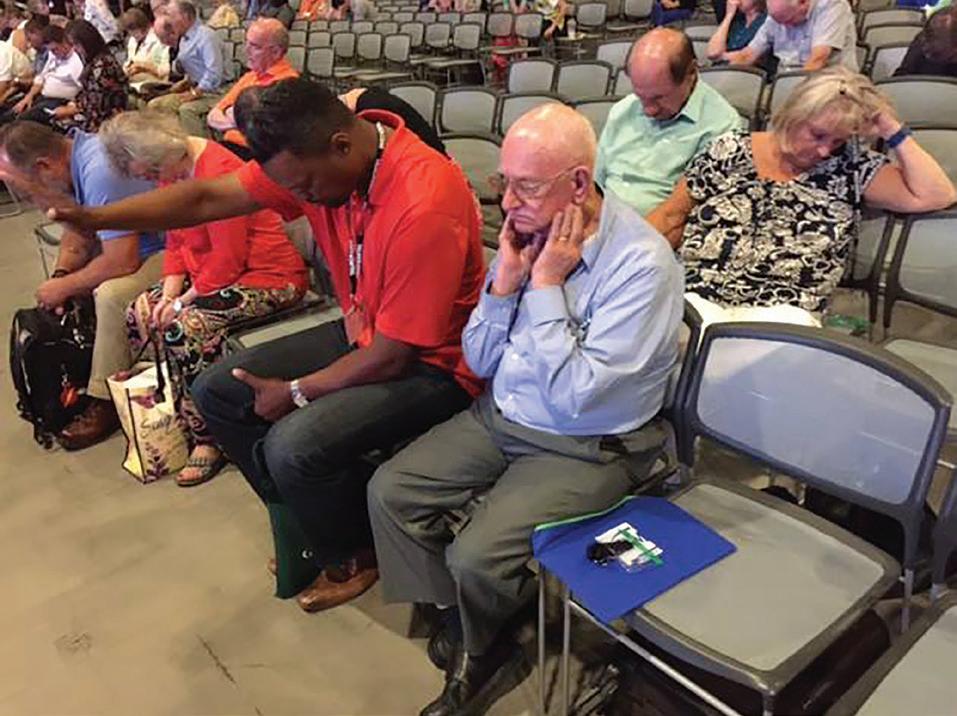
A federal judge has given the City of Chicago a onemonth extension—until July 14—to respond to the church’s lawsuit.
CELEBRATING THE HARVEST – Brandon Kiesling (left), instructor of evangelism at Southwestern Baptist Theological Seminary, prays with Shane, who came forward to rededicate his life to Christ. Bottom photo: Preacher Greg Laurie later in the week announced his church, Harvest Christian Fellowship in Riverside, Calif., will be cooperating with the Southern Baptist Convention.
It started Friday, June 9—the rumblings of an awakening. More than 700 voices worshiped at North Phoenix Baptist Church in Phoenix, Ariz., kicking off the weekend’s Crossover Arizona and Harvest America events.
The North American Mission Board’s (NAMB) Crossover Arizona and Greg Laurie’s Harvest America joined forces to host
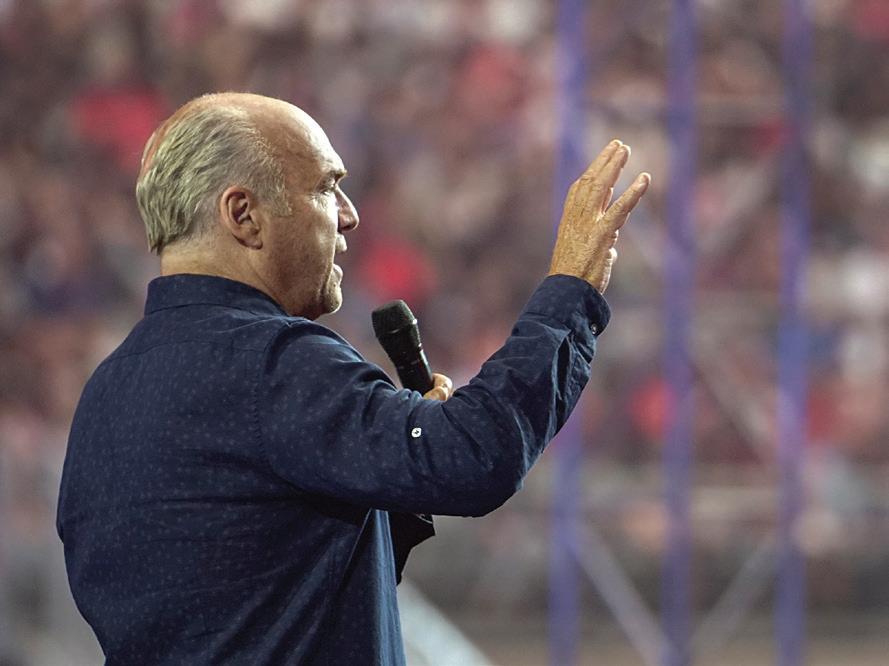
a three-day evangelistic outreach involving training, street evangelism, and service projects before culminating in Harvest America’s Sunday night crusade.
That night approximately 38,000 gathered to hear the good news of Jesus live at the University of Phoenix Stadium in Glendale. Another 3,000 host sites joined the crusade event online.
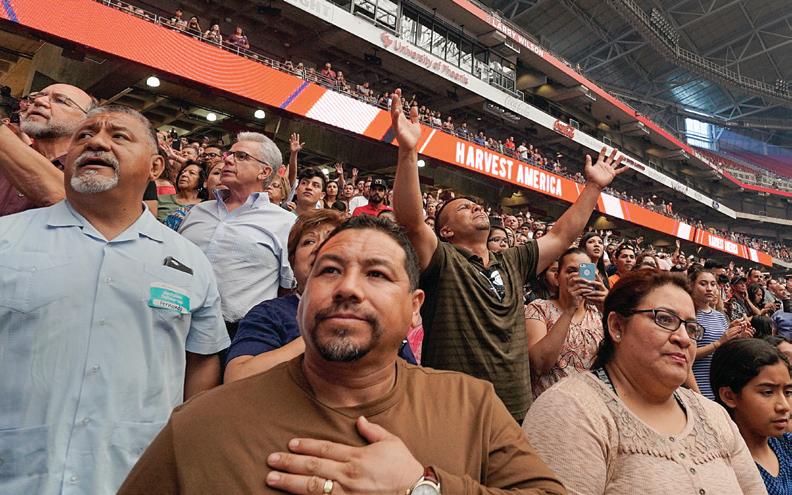
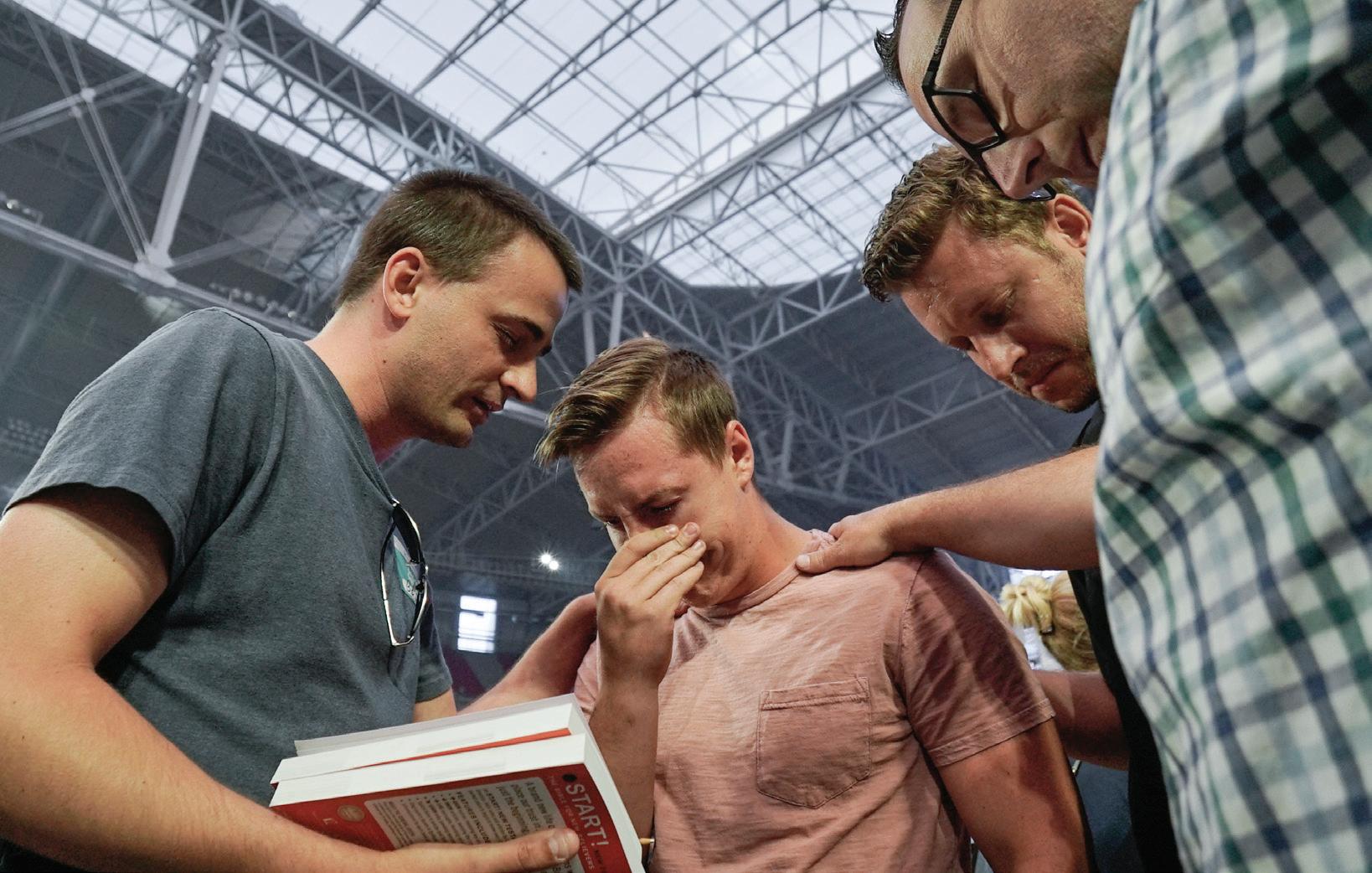
At the end of the evening, 2,904 people walked down to the floor of the stadium to indicate their decision to follow Jesus Christ, and 4,324 more registered their committment online. An additional 310 made a profession of faith through outreach events in the Phoenix area the day before the event, bringing the total to 7,538 who put their faith in Jesus through Harvest America.
In his message, Laurie shared, “People are scared, worried, in anxiety. But let’s have theology without apology. People are hungry for that; they’re hungry to have an honest and hopeful conversation. The last thing that God wants is any man or woman created in His own image to go to Hell. Heaven is His place for all forgiven people and all people can be forgiven at any time if they believe and receive Him into their lives. That’s the message we aimed to share... a message of hope to the nation.”
NAMB is planning a similar partnership next year as the Southern Baptist Convention meets in Dallas.
Scenes from vacation bible school 2017


Awoman pulling dandelions along the sidewalk in front of her house seems willing, even eager to take a break.
“Well,” she says, “the church is over there about a block,” pointing westward along one of the community’s few streets. “But the marker you’re asking about is right over there, waving a hand holding weeds southward.
“That’s where it really started, so that’s where they put the marker.”
It’s clear that Hopedale, Illinois is still proud of its place in history as the one-horse, no stop-light town that birthed an international movement: Vacation Bible School.

In the late spring of 1894, Mattie Pritchard Miles, wife of Hopedale’s Methodist minister, had a bold idea: take advantage of the summer break to teach otherwise idle children about the Bible. She planned a day of Bible teaching and activities “for all children of whatever church—or no church at all.” From the beginning, VBS has been about outreach. Perhaps that’s why its first organizer took the school outside the walls of her church and denomination.
The meeting place was on the grounds outside the elementary school, where the historical marker stands today, with the park next door.
Some 37 children showed up.
What’s even more remarkable is that Mrs. Miles didn’t hold a one-week VBS, or even two-weeks as
It all started here
A monument on an embankment in front of the former Hopedale elementary school marks the place where the first summertime Bible classes were held.
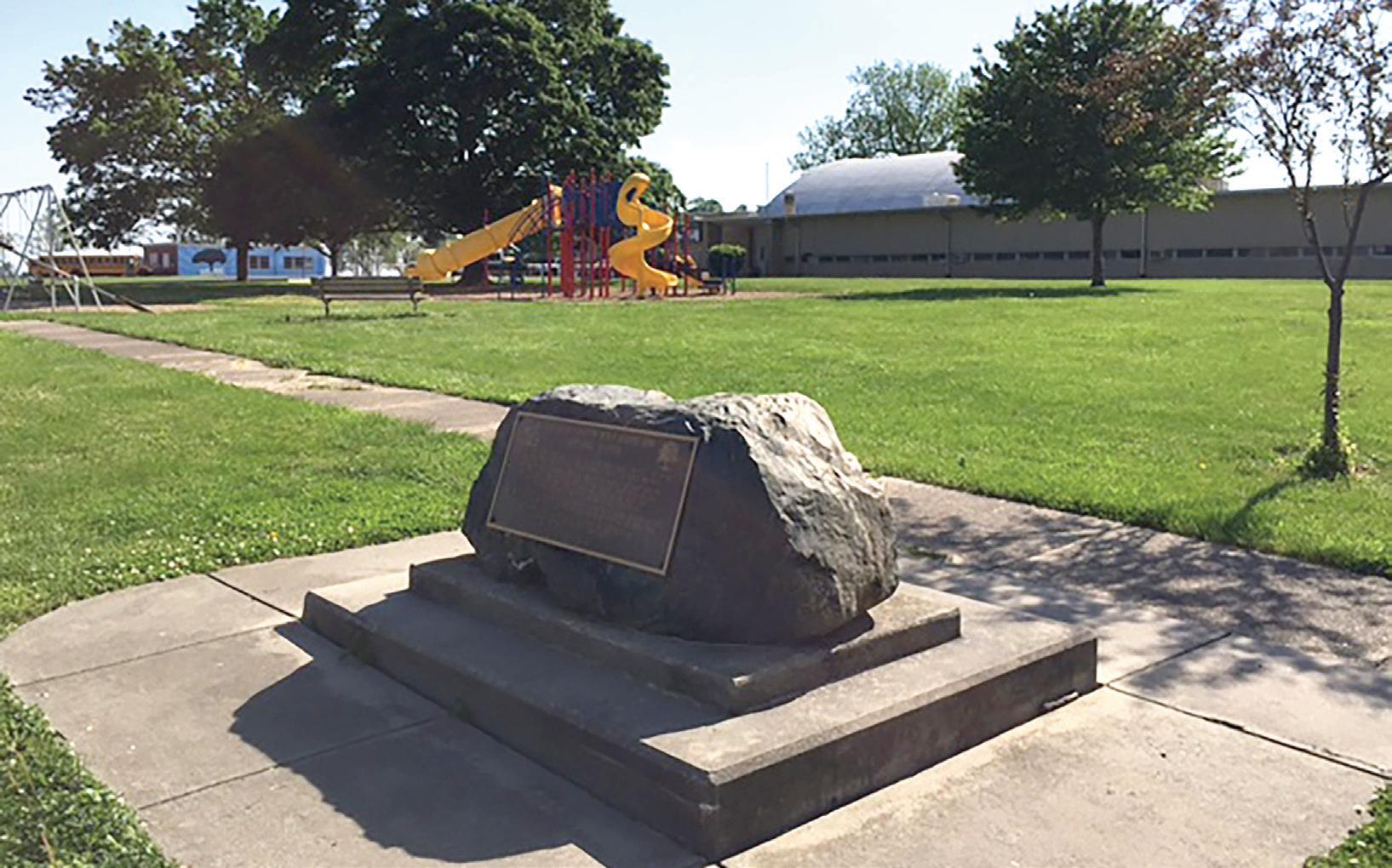
From this spot, a bright and energetic pastor’s wife started a movement that 123 years later has reached every corner of the globe and every denomination.
And who would have imagined it began in a tiny town in central Illinois!

Continued from page 11
some older people may remember. Her Vacation Bible School lasted 26 days over five weeks.
The 1894 school quickly became a model for churches and denominations everywhere. The big stone marker includes a time capsule that is to be opened in 2094, on the 200th anniversary of VBS.
In the meantime, proponents of the summertime discipleship ministry, and Southern Baptists in particular, still see its value for evangelism as well as discipling children (and adults). LifeWay reports that 25% of all baptisms in SBC churches come through VBS. Consider these other 2015 statistics from LifeWay, which produces VBS curriculum especially for SBC churches.
• Every one person trained in VBS in SBC churches results in 1.1 salvation decisions
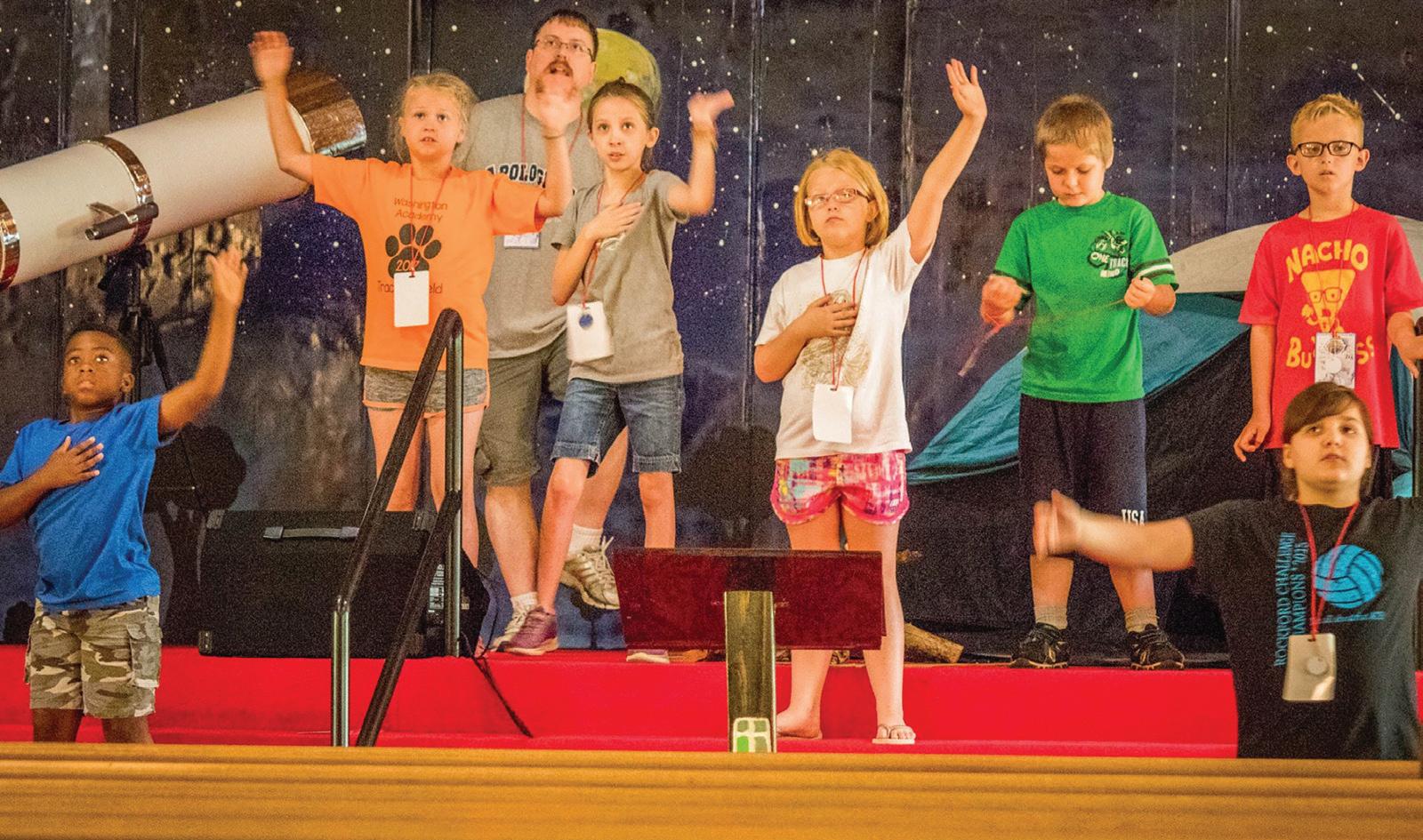
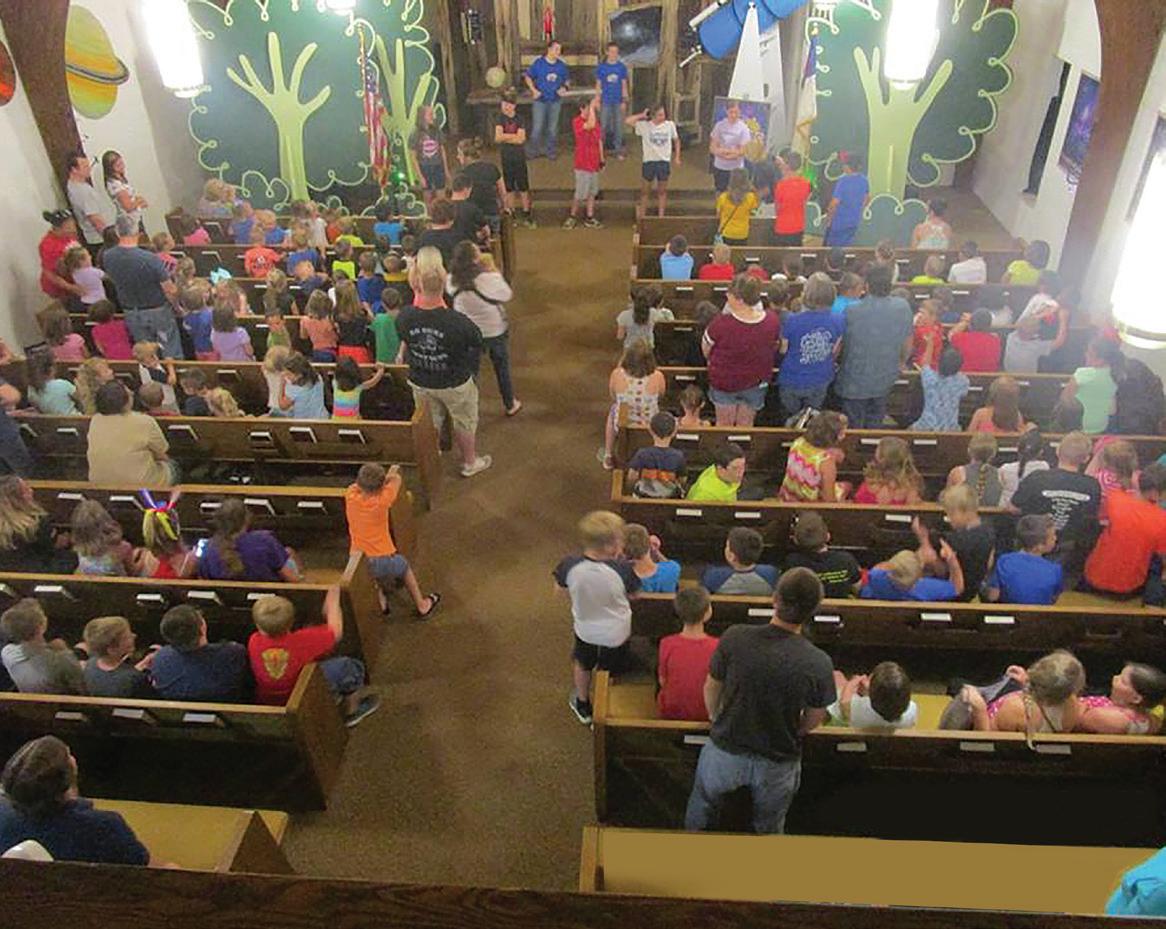
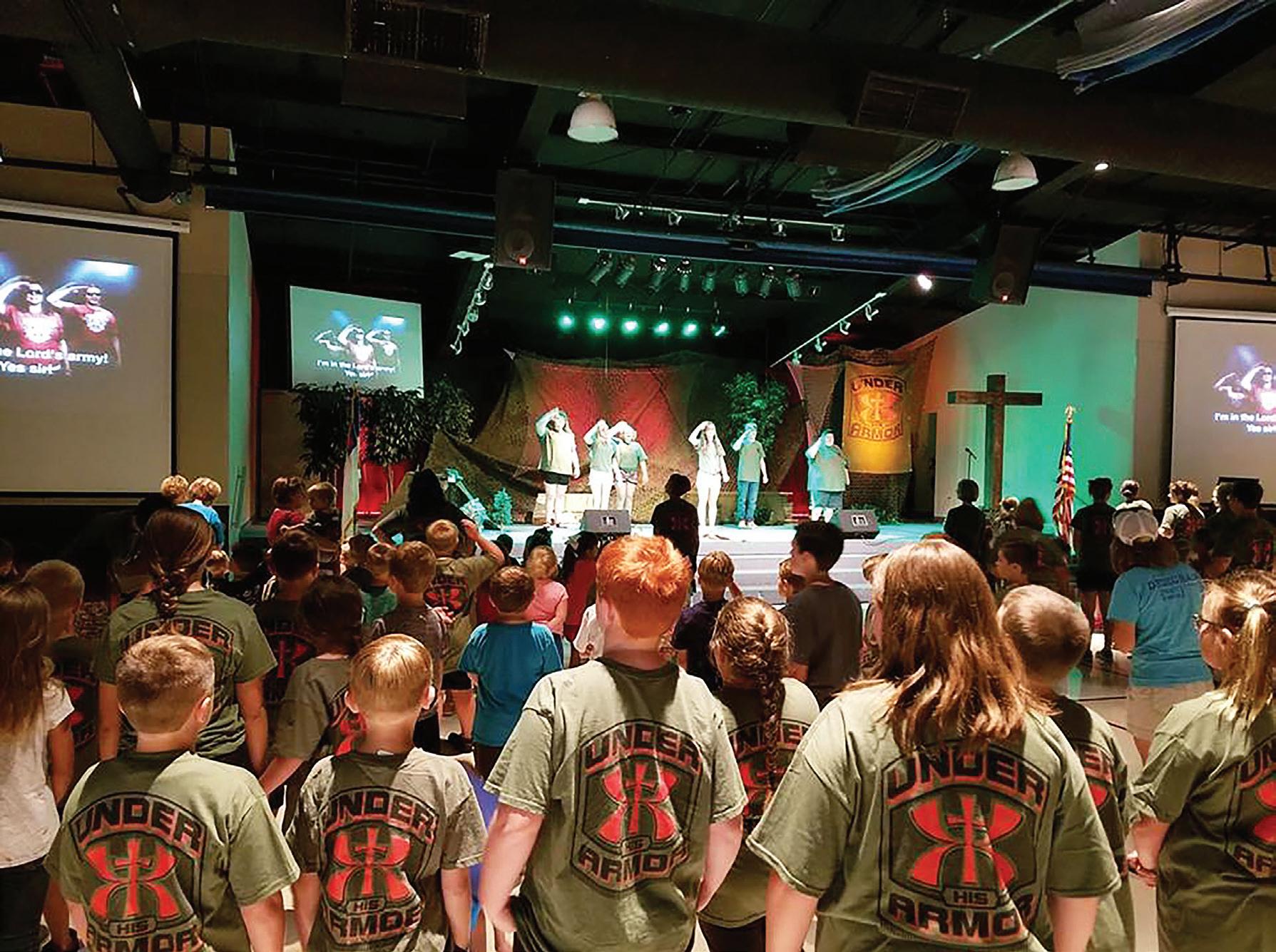
• 10% of people enrolled in SBC VBS are unchurched.
• 2.7 million people enroll in VBS each year.
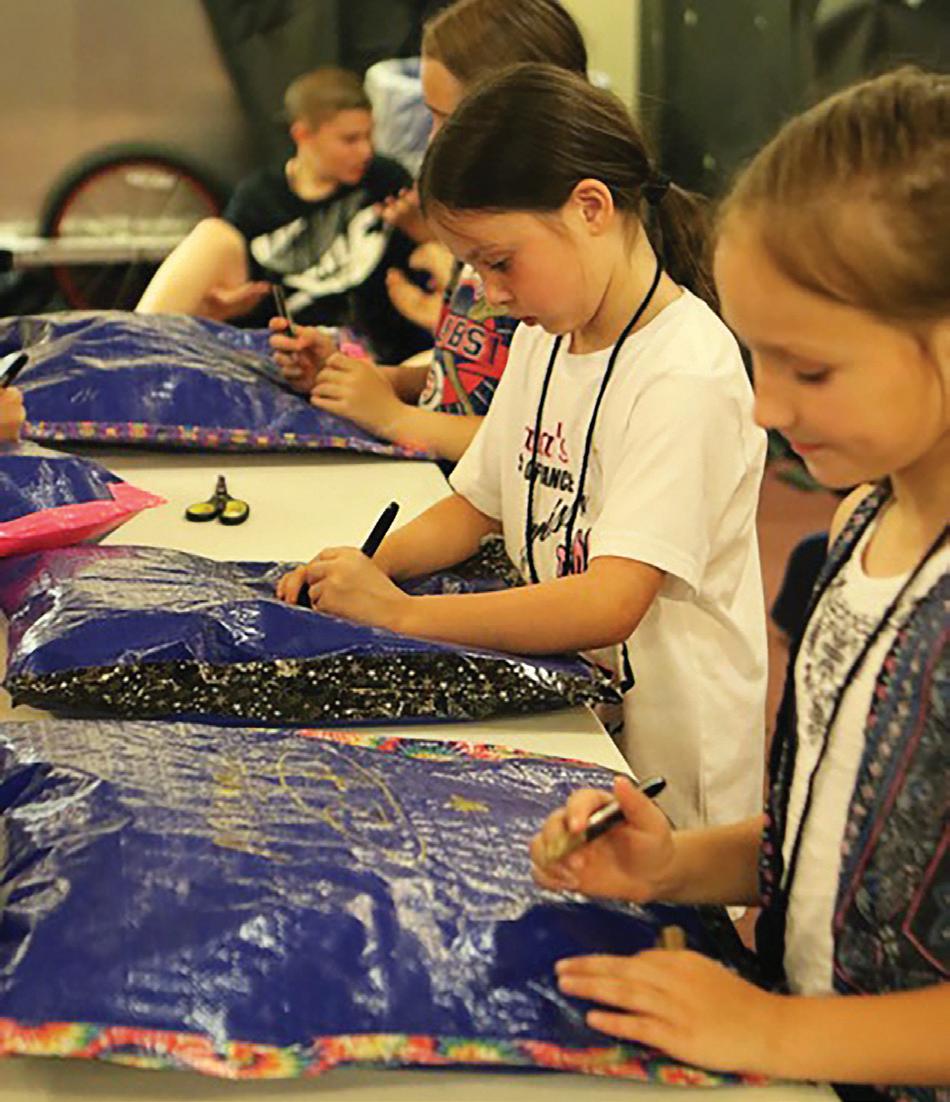
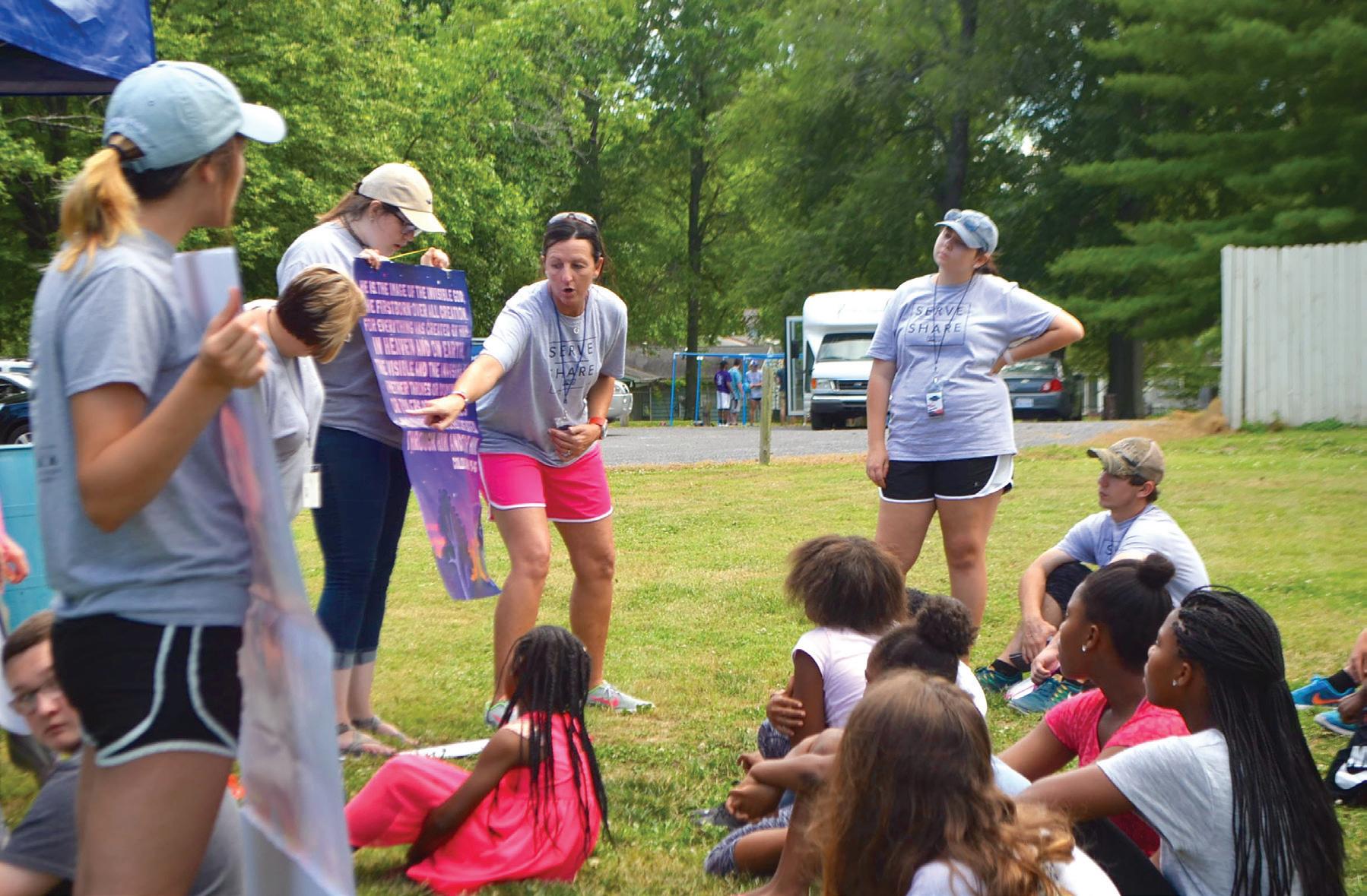
• 72,925 people each year accept Christ as Lord and Savior.
• 2,666 people commit their lives to churchrelated vocations through VBS.
• 56,386 people enroll in Sunday School/ small group Bible study as a result of attending VBS. Mrs. Miles lived 55 years after her first month-long experiment. By 1949, VBS was a well-established tradition that continues to reach children and families and to change lives today.
– Eric Reedteen on a mission
Nashville, Tenn. | Fourteen-year-old Lindsey Yoder walked 15 miles a day along the dusty back roads of southern Illinois, Indiana, Kentucky, and Tennessee in a quest to raise awareness about human trafficking. She departed from Arthur Southern Baptist Church, where she and her family are members, on May 28 and arrived at Nashville’s Bicentennial Park on June 24.
Yoder had a surprise waiting for her as she neared the finish line. Hope for Justice co-founder and Christian recording artist Natalie Grant had heard about Yoder’s effort and was waiting to walk the last mile with her.


“A lot of times we’re moved by an issue, we’re kind of upset and it kind of bothers us, but then we just go back to living our lives,” Grant told a local news station. “But this 14-year-old girl said, ‘No, I’m going to do something.’”
Grant shared a video with her Facebook fans the day before, telling them about Yoder’s Walk4Freedom urging them to donate to the cause. With the additional help from Grant, the walk has raised nearly $38,000 and donations are still being accepted.
In an interview, Yoder was asked what she was looking forward to at her journey’s end. Yoder replied, “Sleep and ice cream.”
She chronicled her 300-mile walk from Arthur, Ill. to Nashville, Tenn. on the Facebook page Walk4Freedom, which includes a link to her Hope for Justice donation page.
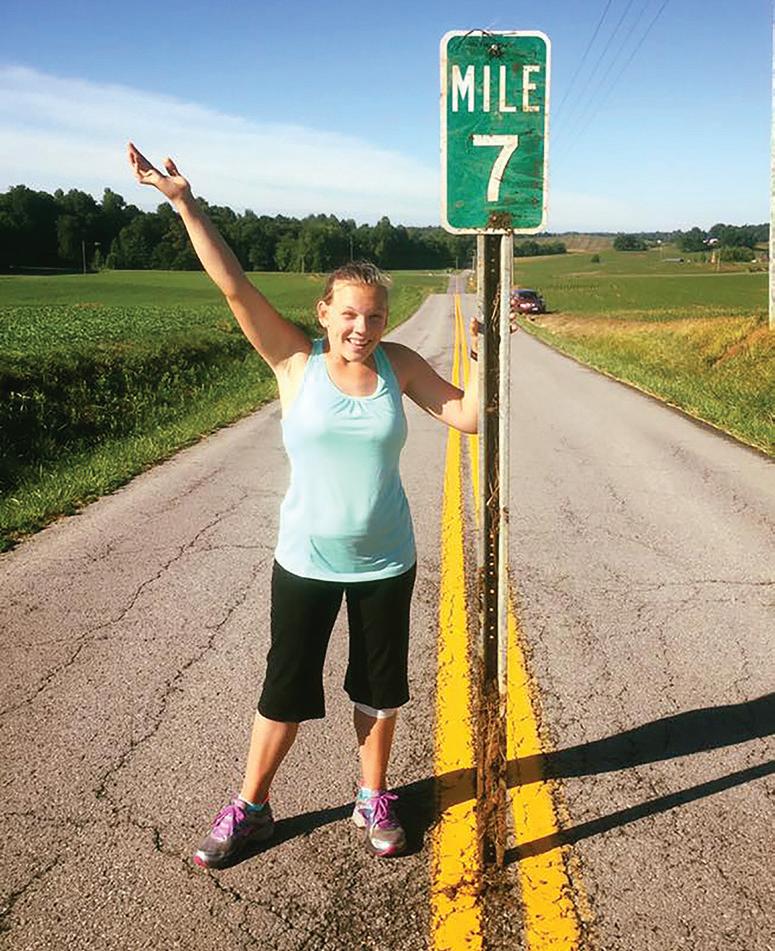


QHow do you know when you should file an insurance claim on a homeowner’s issue, versus just dealing with it and paying cash?
ABasically, it’s when you begin to feel the pain financially.
Let’s say you have a $1,000 deductible on your homeowner’s policy. If you have an $1,100 issue, just pay the $100 out of pocket and don’t mess with it. But let’s say you have the same deductible and a $2,000 problem. Depending on things like your overall financial situation, the value of the house, and the cost of the insurance policy, that might just get you to file a claim.
If you turn in the claim, you’re going to experience a rate increase or cancellation somewhere—at some point— that offsets it. I only turn in substantial claims, meaning claims that are far above the deductible.
QMy in-laws have inherited some money, and they want to invest in real estate. They have offered to help my husband and me buy a home, but they want ownership of some kind as part of the deal. Is this a good idea?
AI’d pass on this offer. It’s not a good deal.
I’m glad they got some money. I mean, that’s great for them. If they want to do some real estate investing, that’s awesome, too. If they want to give their kids a gift out of the inheritance money, that would be a very nice, generous thing to do. But no, we’re not going for a deal where they have ownership in your home.
If you take a deep look into this, you’ll begin to understand there are some things involved that will change the nature of your relationship with your inlaws.
Protect your relationships and your family, Cynthia. Please don’t do it.
Financial advisor Dave Ramsey is a prolific author and radio host.

• Week 4: July 10-14
(Streator, grades 3-12)
• Week 5: July 17-21
(Streator, grades 3-12)
Cost: $160 per person, includes food, lodging, and T-shirt Register: IBSA.org/kids
July 10-14
What: IBSA’s premier worship, music, and arts event for students in grades
6-12
Where: Hannibal-LaGrange University
Cost: $225 per person
Register: IBSA.org/students
July 16-21
What: A week of dynamic preaching, worship, recreations, and small group discipleship for all students in grades
6-12
Where: Lake Sallateeska
Cost: $265 per person
Register: IBSA.org/students
July 23-28
What: Students in junior high through college serve alongside Chicagoland church planters
Where: Judson University
Cost: $265 per person (IBSA churches); $290 per person (non-IBSA churches) Register: IBSA.org/churchplanting
July 28-29
What: Engage the southern Illinois community with a back-to-school fair and mobile medical ministry
Cost: $50 per person; team members responsible for travel to and from site Info: Debbie Muller@IBSA.org
What: Missions experience for college students and adults with skills in carpentry, general contracting, building, or willingness to volunteer on a construction project
Where: Metro Peoria
Cost: $125 per person
Register: IBSA.org/missions (click on “Judea” under “Choose your mission field”)
August 4-5
What: Coaching is a key leadership component in organizations today. Participants will gain an increased awareness of the benefits of coaching and be introduced to coaching tools.
Where: IBSA Building, Springfield
Cost: $25 for IBSA churches; $159 for non-IBSA churches Register: IBSA.org/Women
August 19
What: Bring your church softball team and experience a day of fellowship and competition with other teams from throughout Illinois.
Where: Rotary Park, Decatur
Cost: $130 per team Register: DwayneDoyle@IBSA.org
September 16
“No is a Complete Sentence, Part 2”
What: Learn how to give yourself permission to create boundaries for healthy living by saying “no” with three exercises to practice on your own. 11:30 a.m. – noon.
Where: Your computer Register: IBSA.org/Women
Find more information on ministry positions at IBSA.org/connect Send NetworkiNg items to IllinoisBaptist@IBSA.org
Crossroads Community Church is seeking a full-time worship pastor to provide leadership and vision for worship and arts in a growing church context. For more info, go to www.crossroadschurch.us/staff. Send a cover letter, resumé, video samples of your work, and the last ten orders of service you have created to: Greg Shaw, VP HR, 1N100 Gary Avenue, Carol Stream, IL, 60188 or employment@crossroadschurch.us.
Faith Baptist Church in Marissa is searching for a bi-vocational pastor Please send resumés to Faith Baptist Church, c/o Pastor Search, 1225 School View Drive, Marissa, IL, 62257 or pami_5@yahoo.com.
Christopher Bigger, 40, died on June 13, at UnityPoint HealthMethodist in Peoria. He was pastor at First Baptist Church in Marquette Heights. Bigger received a Master of Divinity from Liberty Baptist Theological Seminary in 2011. He was a member of the Illinois Baptist Singing Churchmen.
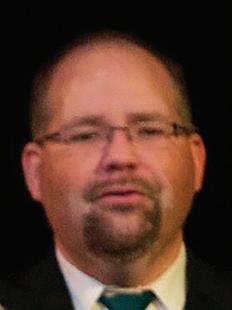
He is survived by his wife Sarah (nee Martindale); son, Duncan (Kylee McClister); and daughter, Olivia. Also surviving are his parents, two brothers, one sister, and 13 nieces and nephews. An infant daughter, Madelyn; and one sister preceded him in death.
In lieu of flowers, a trust fund for the children has been established at Glasford (IL) State Bank.
Virgie Tucker Brown, 72, died June 14, while on a mission trip in Wasilla, Alaska. Brown was a missionary and ministry partner with her husband of 50 years, Michael D. Brown.
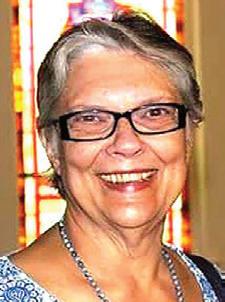
In 1967 the couple was appointed by the Foreign (now International) Mission Board to a two-year term as missionaries in Alaska, north of the Arctic Circle. They served in the Illinois-Wisconsin area for 42 years, including 26 years at First Baptist Church in Winthrop Harbor, before retiring to North Carolina in 2014.
In addition to her husband, Mike, she is survived by their three children, four grandchildren, one sister, and extended family.
In lieu of flowers, memorial donations may be made to the Ollie James and Louise Collins Tucker Memorial Endowed Scholarship at Southwestern Baptist Theological Seminary, Office of Institutional Advancement.
Harper Creek Baptist Church, Battle Creek, Michigan (SBC) seeks an experienced pastor to lead a congregation of 30 to 50 people. This dynamic group of worshipers is grounded in the Word of God and enjoys a blended type corporate worship. HCBC offers salary commensurate with years of experience. If you are interested in helping us share Jesus and grow in our faith, visit www.harpercreekbaptist.org to learn more. Send inquiries or resumes to: PastorSearch@harpercreekbaptist.org or mail to: Pastor Search Committee, PO Box 2467, Battle Creek, MI 49016.
Imagine this: There was a rule passed in your church business meeting that only the trained worship staff or musically auditioned laity of your church was permitted to sing in worship. It sounds preposterous, but it actually happened.
Let’s rewind the calendar about 1,650 years to the Council of Laodicea (363-364). The leaders of the church who sought for quality and reverence in worship were troubled because the untrained congregation sang loudly and so badly that something had to be done to restore beauty. A canon (practice) was adopted in the Catholic religion that continued until 1903 which left congregational participation to a minimum.
There were serious penalties for those who disagreed. Jon Hus, Czech theologian and hymn writer (1369-1415) was martyred for his views on congregational participation. The focus on who is singing was changing.
It was not always that way. In Jewish worship and early Christian worship, the congregation was biblically mandated to joyfully participate. Psalm 149:1 says “Praise the Lord. Sing to the Lord a new song, his praise in the assembly of his faithful people. (See also Psalm 33:1, Colossians 3:16, Ephesians 5:19).
The restoration of congregational participation in worship was one of the radical reforms of Luther and later Calvin, and not without controversy.
Luther wrote hymns with instrumental accompaniment. Calvin only allowed metrical psalmody set to a cappella tunes. Isaac Watts dared to write humanly composed hymns for churches that previously sung only psalms. Fanny Crosby was criticized for writing subjective songs that dealt with human emotions.
The praise and worship movement added the element of personal devotional singing to the Lord and not just about him. Despite these disagreements over the content of songs, post-Reformation congregations held common: participation by the people was paramount. The focus of what we sing was changing—until now.
Charles Finney (1792-1875) is the one credited with being the father of modern Revivalism. The music and congregational singing in Finney’s revival services were purposely intended as a spiritual warm-up so the congregant would be ready to receive the Word. It was very effective as many people were converted.
Many Baptist and protestant denominations adopted this design of worship which is still very common in churches today. Their rationale is that good, energetic music will prepare the attender to receive the sermon. The return to the professional leader had begun. The focus of why we sing was changing.
The seeker movement of the 1990’s unintentionally fostered the pre-Laodicean model that worship should be well done and presented to the audience. Many aspects of current worship trends contribute to a lack of participation.
Because of the digital age, there are now not just a few hundred songs in the hymnal, but hundreds of thousands from which to choose. Therefore, many people are unfamiliar with the music selection. Cover songs from wellknown recording artists, often in keys which are too high for the average congregant, are regularly chosen. The bright lights of the
stage combined with dim seating discourages involvement. The concert style of worship where the worshiper receives more than they give discourages participation. The focus on how we sing is changing.
In an interview with The Gospel Coalition (Feb. 2017), theologian and hymn writer Keith Getty said, “I would dare to say less than five percent of our reformed churches are taking congregational singing as seriously as any of these guys [reformation fathers] did. I’ve heard Ligon Duncan say, ‘There is no part of the worship life more in need of reformation than congregational singing.’”
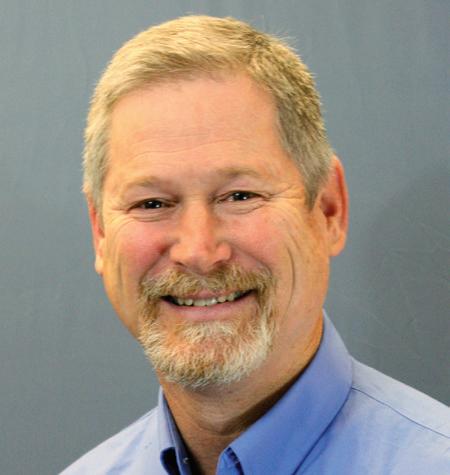
If most agree that congregational singing needs to be reformed, what can be done?
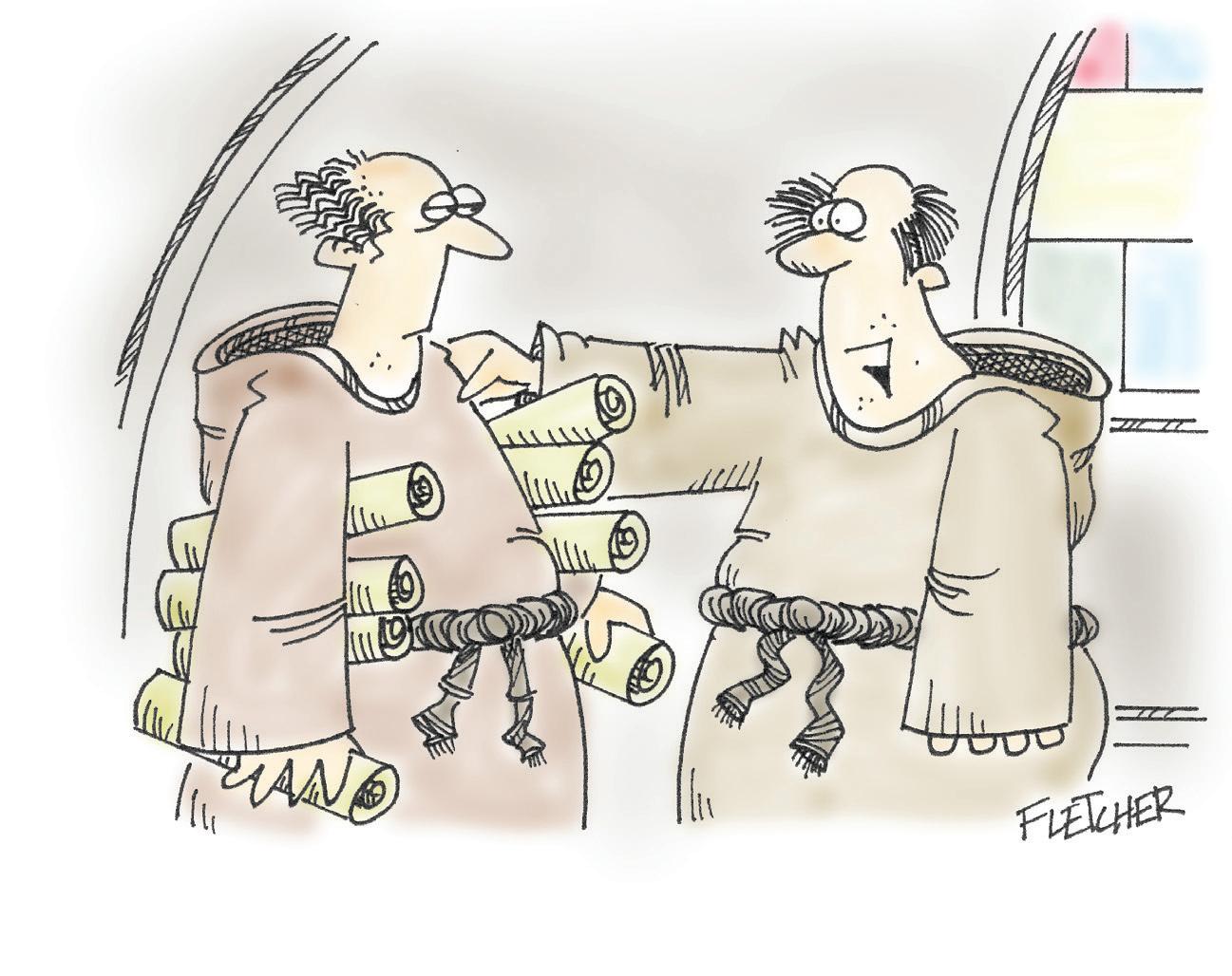
Getty says, “The biggest challenge is for pastors to actually take the lead. Period… The churches with great congregational singing are the churches with the pastor who really, really cares. Music can be contemporary, traditional, black gospel, unaccompanied psalm singing, with or without choirs, leaders, sound systems or hymn books. It doesn’t matter.
“Luther prioritized choosing the hymns his churches would sing,” Getty said, “explaining why they should sing, and then setting to work on teaching and encouraging his people. That’s the single thing that needs to change most.” Getty notes that “worship should begin with the holy act of God’s people singing as the center of the musical experience, and then work out from there.”
Is congregational singing dead? “Congregational singing is far from dead,” Getty concluded, “mainly because it’s connected to a source of life higher than cultural trends or modern comparisons.
“Give me Scotland, or I die!”
It’s a bold prayer for a man whose ministry is founded on the sovereignty of God, and it might seem contradictory to some. How can a theologian count on God to do as he alone wills, yet plead for the Sovereign to be so moved for the salvation of souls and the upheaval of his nation. But that’s how John Knox believed firmly— and how he prayed fervently.
What Martin Luther was to Germany, and Knox was to Scotland. And what John Calvin was to reformed theology overall, Knox was to Presbyterian doctrine in particular. Brave, he kept his head when others were losing theirs to Catholic Mary, Queen of Scots.
“Good news, Brother Andrew... I’ve thought of another thesis!”
Born in 1514, three years before Luther nailed his 95 accusations to the church house door in Wittenberg, Knox grew up in the foment of political revolution and spiritual reformation. He was described as violent in the streets and fiery in the pulpit. Knox was forced to flee Scotland, at one point enslaved 19 months in galley ships. Later, he met Calvin in France. He was so impressed with Calvin’s school in Geneva, according to a Christian History account, that he called it “the most perfect school of Christ that was ever on the earth since the days of the apostles.”
 KNOX
KNOX
Returning to Scotland, Knox led the Scottish Reformation, a movement that birthed the Presbyterian Church and ultimately ended the reign of the Catholic queen. “He lived in the 16th century, and much of modern Scotland is really the fruit of his labors,” said Jeff Tippner, a minister in St. Fergus and organizer of a post-Brexit evangelistic campaign with the Billy Graham Evangelistic Association.

When Graham’s grandson Will preached at that series of crusade meetings in Scotland last year, he invoked the prayer of Knox, as his famous grandfather had in 1955. The elder Graham explained the sometime dichotomy of reformation theology and crusade evangelism this way: “I believe in a sovereign God who still performs miracles.”
– Eric ReedGains of the Reformation may be endangered by current musical trends
Location: Chicagoland
Focus: Bosnian, Croatian, and Serbian immigrants
Characteristics: Chicagoland is believed to have one of the largest concentrations of former Yugoslavians—possibly over 500,000. But the city has no evangelical churches for Bosnians, Croatians, or Serbians.
Prayer needs: Pray that God would pour out his Holy Spirit upon Chicago’s Bosnian, Croatian, and Serbian populations, so that the first of many churches would be started here to reach their diaspora in the U.S. and the world.
– IBSA Church Planting Team

One reason many weekend worship services are ineffective is because people spend too little time preparing themselves for worship. Evangelist and professor Chuck Lawless says take some time to answer some questions on Friday to be ready for Sunday. Here are a few from his list:
QI want to encourage evangelism in our church, but I don’t want to usurp the pastor’s role. Can someone other than the pastor lead a witnessing program?
1. Have I prayed for my worship leaders and my pastor this week?
2. What have I learned from God’s Word that I didn’t know last Sunday?
3. Whom have I invited to attend church with me this weekend?
4. Am I harboring bitterness and unforgiveness toward someone?
5. Do I expect everything to be the same this weekend, or do I expect God to do something surprising and mighty?
May God prepare our hearts for great worship events this weekend!

49% 30% 20%
Read: 1 Kings 18-19 1%
Elijah was a man zealous for the Lord. With godly courage, he confronted Ahab about the impending drought. He remained faithful to God in the wilderness. He spoke with the authority of the Lord as he gathered Israel to Mount Carmel and obediently led God’s battle against the false prophets. He proclaimed the truth of Israel’s rebellion against God and their rejection of His covenant.
Even though God provided a climactic victory, Elijah endured intense spiritual, emotional, and physical anguish, especially when Jezebel threatened his life.
AWhat a GREAT question! Absolutely. Pastors are busy with Bible study, sermon preparation, counseling, administrative duties, hospital calls, weddings, funerals, meetings, and conflict management—plus a myriad of other things. I’m confident if you asked, he’d be glad to give you that responsibility and not feel like you are in any way usurping his authority. Imagine what would happen in many of our churches if the people, not just the pastor, were engaged in impacting the community with the good news of salvation. My challenge this year to our churches has been “each one reach one.” Think about what would happen in your church if every member was able to bring one friend, neighbor, or family member to Christ and follow up with baptism. You could be the catalyst to train others to do exactly that.
of adults in Illinois say they seldom or never read the Bible at least once a week once or twice a month, or several times a year responded “don’t know”
– Pew Research
The strain became too much for him as he isolated himself from others, falsely believing there were no other prophets of God in Israel. He was so depressed that he prayed to die, then slept soundly from exhaustion and despair. However, God cared for Elijah by providing food and water for him.
KEVIN CARROTHERSThen God sent him to Horeb for another mountain top experience. There the Lord gave Elijah a fresh encounter of his presence, not in the fire or the wind, but through a gentle whisper.
Finally, God brought Elisha into Elijah’s life. Elisha would become a surrogate son, a friend, and a confidante to the end of Elijah’s ministry, helping him finish strongly.
PRAYER PROMPT: Father God, forgive us when we isolate ourselves from you and your church and focus only on the adversity of our lives. Refresh us physically. Restore us spiritually. Renew our minds daily. Encourage us through others. Let us cast our cares on you, because you care about us. Amen.
Kevin Carrothers serves as director of missions for Salem South Baptist Association and is concluding his second one-year term as IBSA President.
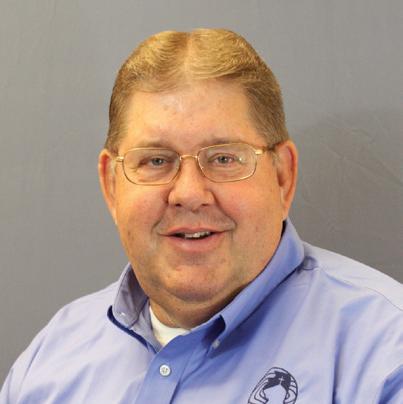
Following Jesus’ approach with disciples Peter, James, and John, I identified three men as my inner circle of leaders. Now I hear complaints that “the pastor’s playing favorites.” One person is really jealous. What should I do?
A

You quite rightly understand that you only have so much time to invest in others. While Jesus had 12 disciples, he often invited Peter, James, and John into a more intimate teaching relationship. People can be selfish and want to capture your time. Invest in your leaders and don’t allow one unhappy person to thwart what you are accomplishing in your mentorship of others. That person is demonstrating his immaturity, which means he is not ready to be a leader. Continue on the path you are going and in the end, you’ll be glad about where you invested your time.
Pat Pajak is IBSA’s associate executive director for evangelism. Send questions for Pat to IllinoisBaptist@ IBSA.org.
